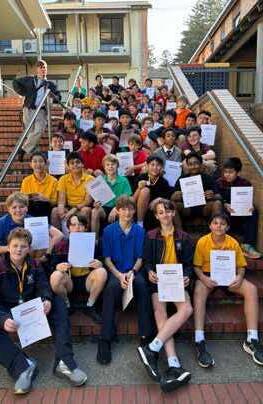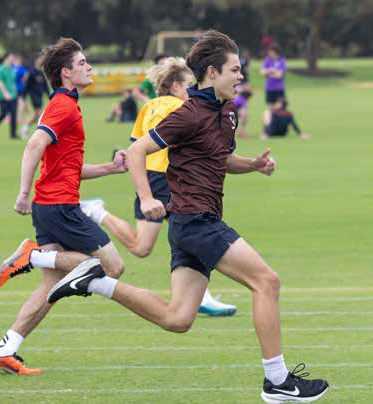
UNITING THE SCOTCH COMMUNITY



100 years of memories on the Memo












UNITING THE SCOTCH COMMUNITY



100 years of memories on the Memo











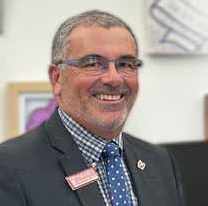
Mr Brad Gill Head of Middle School (Acting Headmaster)

During the latter part of last year, the Headmaster stopped by my office in the Middle School. If you channel reflections of being called into the Principal’s Office as a student, you will appreciate my level of apprehension with his unannounced visit and possibly also insight into my nervous predisposition or my guilty conscience.
My worry was to be short-lived as Dr O’Connell simply asked if I would consider stepping in to the role of Acting Headmaster
during his planned sabbatical. This invitation reflects Dr O’Connell’s commitment to ‘growing the people who work here’ and it was simply my turn as Mr Burt had deputised for ‘The Doc’ during his last leave from the College.
His confidence in the leadership group of the College is overtly known and he often answers the “Who runs your school when you are not there?” question with “The same people who run it when I am.” And he is, largely, correct. An organisation of this magnitude requires a diverse set of professional skillsets that are connected through collaboration, communication and exceptional processes and systems. It is genuinely helped by having exceptional leadership too and, thankfully at Scotch we have them all. So, it was with a degree of confidence in the support structures that had me believe that I may be able to hold the reins for a short while.

In 2024, the role of a Headmaster at a singlegender boys’ school requires a multifaceted approach to leadership and education.
The Headmaster is tasked with upholding the school’s mission and values, while
also adapting to the evolving educational landscape. This includes fostering an environment that supports academic excellence, personal growth, and social responsibility among students. As the educational sphere increasingly recognises the importance of emotional intelligence and mental wellbeing, the Headmaster must ensure that the school’s programmes and culture reflect these priorities. Additionally, with the ongoing discussions about gender equality and inclusivity, the Headmaster plays a crucial role in educating young men about respect, empathy, and the significance of contributing positively to society.
It is worth noting at this point that I haven’t really acknowledged a school’s core business, education. The mandated requirement that we deliver the Australian National Curriculum. Clearly, we do, and we work hard to do this to the very best of our ability and we have a comprehensive resource commitment to ensuring we honour this core tenant.
In 2024 though, the breadth of responsibility has grown significantly from what was once deemed ‘school business’. The Headmaster is also responsible for steering the school
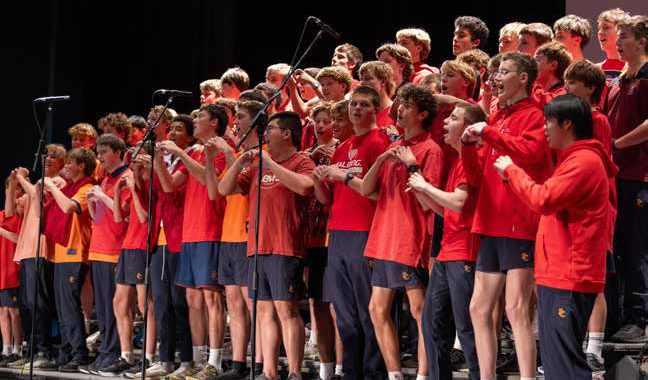

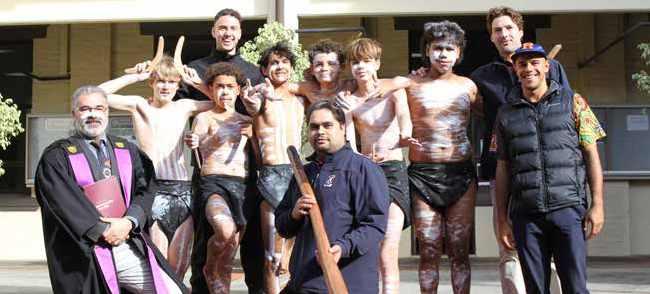
through the challenges and opportunities presented by technology and digital learning tools, including the everchanging social media landscape and the evolution of AI. This involves integrating innovative teaching methods that enhance learning experiences while preparing students for a future where digital literacy is paramount. Moreover, the Headmaster must navigate the complexities of single-sex education in a world where gender roles are continuously being redefined. This includes evaluating the relative value of single-sex education in comparison to co-educational models, as highlighted in panel discussions at international educational conferences around the globe.
Furthermore, the Headmaster must maintain a strategic vision that aligns with the expectations of parents, the community, and educational authorities. This includes
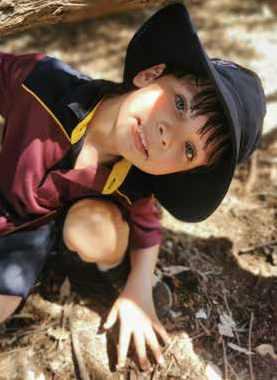
managing resources effectively, recruiting and retaining high-quality staff, and ensuring the school’s financial sustainability. The Headmaster also plays a pivotal role in building partnerships with other educational institutions, businesses, and non-profits to enrich the educational experience and provide students with broader perspectives and opportunities.
In light of the debates surrounding singlesex education, the Headmaster must be well-informed about the latest research and trends. While some studies suggest that single-sex education may not significantly impact academic outcomes compared to coeducational settings, the Headmaster must consider the unique benefits that a singlegender environment can offer. These include tailored teaching approaches that cater to the learning styles and interests of boys, as well as the creation of a learning environment free from certain social pressures associated with co-ed schools.
Ultimately, the Headmaster’s role is to lead with vision, integrity, and a deep understanding of the educational needs of boys. This requires a commitment to continuous improvement, innovation, and a willingness to challenge traditional norms when necessary. By doing so, the Headmaster not only contributes to the personal and academic development of the students but also to the broader discourse on education in a rapidly changing world.
Reflecting on the tenure as Acting Headmaster at Scotch College, it’s evident that the role is multifaceted, encompassing the stewardship of the school’s vision, the management of its day-to-day operations, and the nurturing of its community. The position demands a dynamic blend of leadership, empathy, and strategic thinking. It involves not only upholding the educational standards and values of the institution but also inspiring both staff and students to strive for excellence.
In a school context our success or effectiveness is determined by the quality of the young men who graduate from Scotch College.
For me, the role of Acting Headmaster is nothing like being the ‘Actual Headmaster’.
Stepping into the role of Acting Headmaster presented a unique opportunity to engage with the school community and initiatives in ways that Dr O’Connell may not have the capacity to explore given the aforementioned. I certainly had the flexibility to foster closer relationships with students and staff and address specific localised issues with a fresh perspective. This amazing opportunity was a proving ground for the development of my leadership skills, allowing me to practice my ability to manage a school effectively while also bringing a new energy to the position.
I had hoped there would be a chance to leave a distinct mark on the school’s legacy, shaping programes, and policies that reflect the immediate needs and goals of the school community, but the reality is that the reverse was true. My short tenure in the big chair allowed me the opportunity to gain a new perspective of all that we do here. The expression ‘the proof is in the pudding’ is used to say that the real worth, success, or effectiveness of something can only be determined by rating the final product — just as the best test of a pudding is to eat it.
In a school context our success or effectiveness is determined by the quality of the young men who graduate from Scotch College. My term as Acting Headmaster allowed me to see that the commitment of the people who choose to work here and our students’ ability, more often than not, to appreciate this ensures that our final product is something of which to be extremely proud.


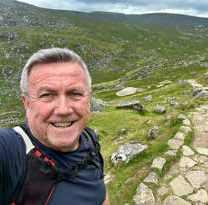
In July 2011, as part of my commissioning service as the new Headmaster of Scotch College, I was presented with a hand-crafted Celtic Cross from the College’s Design and Technology department.
It was a beautiful piece of work, a gesture reflecting what I assumed to be the Christian and Celtic foundations of the College. While I assumed a connection to this Celtic symbol, on reflection there was no contextual background relayed to me as to the specific role played by Celtic history or spirituality at the College.
Having previously been the Head of a Uniting Church institution, I was well aware of the College’s strong Scottish Presbyterian heritage, so I didn’t give it much further thought at the time.
However, looking back, it was this simple gesture that lit a small fire of intrigue in me about the College’s heritage and whether or not there was a strong alignment with Celtic history and spirituality.
The lighting of that 2011 unexplained flame now finds me some 13+ years later writing this article in the midst of the Glendalough mountains, in Co Wicklow Ireland, rich in the story of St Kevin and his depth of connection to Celtic history and spirituality and its role today. As for me, I am here simply trying to
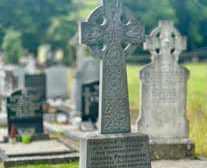
make sense of my own Celtic connections and that of the College, in order to assess where Celtic Spirituality should be positioned in the College’s on-going journey.
Our College is known as a community which values a progressive approach to education, while never forgetting how we got to where we are today. It is important to stay committed to our heritage through a deep understanding and appreciation of where we have come as we continue to journey forward. While exciting, this is not a simple journey, and one that will be ever evolving, as it should be if we continue to believe in a philosophy of continual improvement and progress.
We are also very cognisant of the importance of not allowing complacency to become an option. In his book Anam Cara (meaning soul friend), the Irish theologian John O’Donohue rightly highlights the trappings of becoming over familiar. He argues that generally the familiar, precisely because we consider it to be familiar, is actually not really known. We need to consciously go deeper with our thinking. Familiarity can be a quiet and slow death allowing routine thinking and action to mask the need for change. As such, we may miss the hidden jewels that await our discovery in the sands of time.
There is an Irish saying that ‘It is in the neglected or unexpected place you find the lobster’. For leaders this may well be at a time of quiet reflection or through an unexpected experience. What I have come to appreciate in my search into Celtic spirituality, and the life of the Celts, is the important role of pilgrimage and that of the soul, especially within the context of soul friends (Anam Caras).
For the Celts, pilgrimage was everything, it was in their DNA. Some of the great Celtic stories came about through individuals such as St Kevin, St Bridget, St Patrick, St Columba, St Columbaeus, St Aidan and so many others. Their selfless journeying as pilgrims based on a calling from the heart or soul to unknown places with no preconceived plans other than to take the word of the scriptures to those who would listen, has led to the establishment of institutions such as schools, hospitals, congregations, and religious orders that still exist today.
Modern school leadership in the current climate is undoubtedly complex and challenging. Society is expecting more and more of schools and their leaders. In referring to leaders, I include teachers and ancillary staff as leaders given the impact they have
on the students within their respective schools and colleges.
No doubt the increasing challenges are in parts due to the many influences thrust upon schools from external regulatory authorities and agencies. These are coupled with schools’ own internal governance expectations of compliance, strategic plans, risk management charts and all matter of increasing fiduciary activities.
Having said this, these may not be the only contributors. Maybe we need to consider that complexity is the result of having lost our sense that leadership is a pilgrimage of the soul and that just possibly, we are forgetting that it is important that we do not lose or sell our souls in order to align with or match a paradigm of leadership held by others. My question is, as pilgrims on a journey of stewardship, have we lost our capacity to lead by our soul?
In reality, we cannot separate the soul of a school and its leader, they are intertwined and through this have a two-way impact. If the leader understands the importance of soul, then so will the staff. The result of this strong internal alignment will be the clearly defined manifestation and visible alignment of a community leading as one through their shared soul.
If you are like me, you may have spent a lot of on your own time on reading leadership journal articles, books, and reflections with the goal of being the best image of a leader one can be. A lot of this reading focuses on leadership from an educational perspective provided via educational leadership academics such as Fullan and Hargreaves, or from business literature and books like Built to Last by Collins and Porras, Good to Great by Jim Collins or a plethora of other academic books and articles espousing what good leadership looks like.
Maybe hundreds of years ago, without this plethora of leadership theories and manuscripts, the Celts had already discovered the jewel in the leadership sand. Could it really be that leadership is simply a pilgrimage of the soul?
If we lead with soul, not through an imbalance of the transactional elements of leadership, then those who we lead will, as John O’Donhue urges, be exposed to the unfamiliarity, and through such exposure, grow as professionals, finding the role of the soul in their own educational pilgrimage.



Mr Tim Wiese Chair

I love the Olympics. Two weeks of spectacle with the world’s best athletes going head-to-head, for many the pinnacle of their journey in a sport that they have been participating in since childhood.
I also love the stories of the path that has taken them there. Rarely is there a straight line to the heady heights. More often than not, there is hard work, failure, and struggle. Resilience and persistence are required to overcome adversity. Medals are rare, and for most the journey to qualify, the opportunity to compete and the learnings along the way is compensation enough.
I was pleased to welcome the Headmaster, Dr Alec O’Connell, back from his own journey, having been on sabbatical over the last term. As well as being an opportunity to recharge the batteries, it enabled him
time away from the day to day demands of running the College to network and study. His absence has enabled Mr Brad Gill to act as Headmaster, and in turn, Ms Lauren McCormack to fill Brad’s role as Head of Middle School. On behalf of Council, I would like to thank Brad for the diligent and committed focus he has brought to the role and his considered interactions with Council. The business of Scotch is complex and multifaceted, and I enjoyed the reflections that a fresh set of eyes brought to its many aspects. The College now has a new Strategic Plan, a guiding document for the College through to 2028. It has had a lengthy gestation, with work starting back in 2021 and the final polish being applied in June of this year. It confirms our mission as an educational institution, our vision and our values. The document identifies factors that have made us successful and lays out objectives and targets for 2024 -2028. I would like to thank the Headmaster, members of the Executive and members of Council for their input into the process and for the careful crafting of the document to reach the final product. The Strategic Plan 2024 - 2028 is now available on the College website.
In recent times, it has been incumbent on the Chair of Council to also Chair the Finance and Planning committee, one of Council’s three standing committees, with Risk and Masterplanning being the other two. With
the aim of constant improvement to our governance procedures, we have separated the two roles. This has allowed Ms Naomi Flutter to step up from deputy, to Chair the Finance and Planning committee. A great deal of the heavy lifting within the governance structure of the College is done by this committee, making Naomi’s commitment a significant one, and I thank her and her family for the commitment.
By the time this article gets to publishing, the Year 12 cohort of 2024 will be reaching the end of their journey at Scotch, and with the reality of life beyond Scotch suddenly a very real prospect, another journey is about to begin. One of the perks of my role is to attend many of the landmark events throughout the year, and get an insight into the calibre of the boys that are turning out. Anzac Day, the School Play, Jazz night and the many sporting achievements have all been a credit to the boys, and I wish them all the best for the future, as they join the ranks of Old Scotch Collegians.
I will finish by extending my thanks to all members of the Scotch College Council for their commitment to enhancing opportunities for the boys and ensuring good governance and planning to help achieve the vision for the College. Your input is highly valued and meaningful. On behalf of the broader Scotch community, I thank you for your time, and the experience and skills which you contribute so freely.
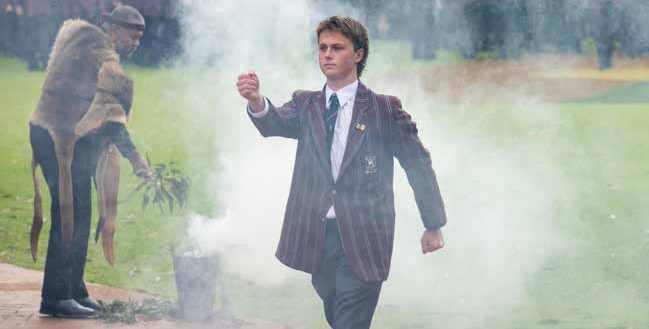

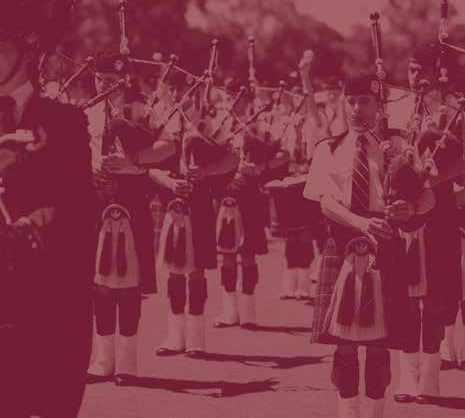

Mr John Flecker Chair of Foundation
I’d like to start out by thanking Naomi Flutter for her time on the Foundation Board.
Naomi always found time in a very busy schedule to provide wise insights. With Naomi taking on some additional duties on the College Council she has stepped down as a Council Nominee on Foundation.
Next, I’d like to extend a warm welcome to Ben Bartholomaeus who now joins the Foundation Board as a Council Nominee.
Ben has a tremendous depth of experience in investment and management of funds that will be of great benefit to Foundation. As a current Scotch parent, Ben also brings that very important perspective to the table.
I would also like to express my thanks to OSC Preston Hammersley, who is adding another perspective to investment opportunities to assist Tim Lyons and Murray McGill in overseeing the JMF portfolio of direct investments.
I never cease to be impressed by the willingness of busy people to provide their time and expertise to Foundation to further its aims in supporting the College. It is what makes the College community so strong.
As the College concludes its Strategic Plan 2024-2028, Foundation will review that Plan to ensure we are aligned where relevant for the immediate term whilst remaining focused on the long term, as is our remit. In the last edition of Clan, I referred to the annual meeting of Foundation with the Council’s Finance & Planning Committee meeting. That is an important proactive forum to share views and intentions. The College’s Strategic Plan is another key part of the framework within which Foundation can make its own strategic decisions in appropriate context.
Foundation continues to seek to grow the membership of The Alexander Society and welcomes and thanks its new members.


In recent months, the College has invited members and guests of the Society to the College’s 2024 musical, School of Rock, the annual Jazz Night at the UWA Club and the Anzac Day Dawn Service. If you are considering leaving a bequest to the College, the Philanthropy Office would love to hear from you, particularly as they continue to find opportunities for Society members to engage with the College community. Please contact the Philanthropy Office on 9383 6987 or at philanthropy@scotch.wa.edu.au.


Bequests are so important to the future of the College and will leave a lasting impact on our whole community. The Alexander Society is growing, and we would love you to join too.
All those who have made a bequest are welcomed to join The Alexander Society and we are eager to increasingly engage with the group in coming years.
Please contact Mel Colling, Advancement and Philanthropy if you have included the College in your will or are interested in doing so on +61 8 9383 6987 or philanthropy@scotch.wa.edu.au
To arrange a free will or receive advice on wording for an existing will contact Pragma Lawyers via +61 8 6188 3340 or hello@pragma.law
Learn more
scotch.wa.edu.au/giving
certain places have developed a particular significance for us as individuals and as communities.
In his wonderful book, A Sense of Placea Christian Theology of the Land’ (1989), retired Uniting Church minister Geoff Lilburne unpacks the link between land and identity in Indigenous and Christian spiritualities. He demonstrates how land and ‘a sense of place’ awakens in us a desire to preserve the ecological diversity and uniqueness of our world.

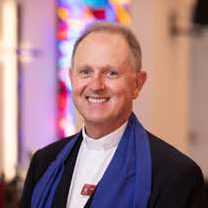
regularly able to spend time in these places, we develop an awareness of the Divine and we nurture our physical, mental, emotional, and spiritual health. The key to developing thin places is to be aware of how spaces affect us and to use that knowledge to decide on a space that works for us. We all have a sense of when a space feels right and good. Once we have recognised the ingredients that make a place ‘thin’ for us, it becomes much easier to find or create such places where we can take refuge when life gets overwhelming.
With our magnificent playing fields being nestled between Lake Claremont and a pristine coastline, and with Bold Park just up the road, it is not a stretch to suggest that our geography contributes significantly to who we are.
Where we are has at least some influence on how we are. Location impacts on us. Some places impact negatively, while others can be positive and affirming. When we begin to consider the impact of place on our humanity and relationships, the sacredness of geography becomes apparent.
Most sacred texts situate their narratives in a very specific place. The Hebrew Scriptures are no different. In fact, Old Testament scholar, Walter Brueggeman (The Land: Place as Gift, Promise, and Challenge in Biblical Faith, 1977, p. 3) claims that the Jewish faith in God cannot be understood apart from the gift of the land. The Old Testament reminds us that every human story is located not just in time but also in a place. Over time,
The ancient Celts believed that in some places, which they called ‘thin places’, the veil between the material and spiritual worlds is especially thin and permeable. Similarly, every human culture on the planet has revered certain designated buildings, pieces of ground, or environments as sacred. While there may not necessarily be anything particularly unique or overtly spiritual about these places, they do have the capacity to open in us an awareness of the Divine. While thin places are often associated with natural settings such as mountains, rivers, forests, they can also be buildings such as cathedrals, temples, and other sacred sites. In a Celtic world infused with God’s presence, there was a constant expectation to meet God. Nothing was too trivial to be sanctified by a prayer and blessing. This led to the sanctity of ordinary, everyday tasks, and to meeting Christ in every person.
Creating our own thin places
When so much of our environment is purely functional, setting aside certain spaces as sacred can be transforming. When we are
In a busy and sometimes unpredictable world, having access to thin places can revive us and energise us. And as connection with the place grows, we may find that our contribution to a more compassionate world is as simple as cleaning up when we encounter mess, picking up when we come across litter, and helping in some small way to fix up the broken places around us. These little gestures of care have the extraordinary ability to make the sacred more visible in even the most unlikely locations.
As we seek to live lives of meaning, contribution, and connection, being aware of the power of place can help us to be mindful and intentional about how we relate to the places in which we live, work, and play. Being aware of what makes some spaces unsafe may inspire us to do our bit to create places of safety, creativity, rest, and joy for all the family members, friends, neighbours, and strangers in our corner of the world.
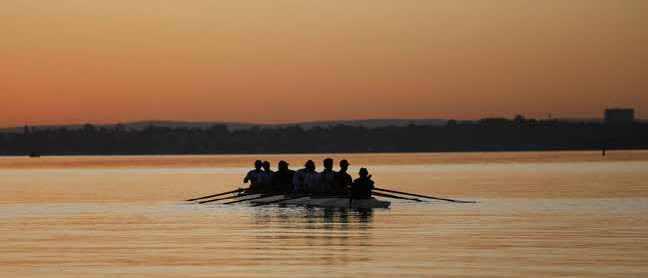
We all have a sense of when a space feels right and good.


David Walton Captain of School

As usual, the second semester has been full and exciting with a wide variety of different activities throughout the school.
As a school, we have continued to foster a sense of interconnectedness between the three sub-schools. This is best exemplified through our Year 2 and 12 Breakfasts. In Autumn Term, we held two breakfasts which involved building domino chains and reading our favourite books from Year 2. I can still remember being in Year 2 and attending one of these breakfasts and I can personally attest to the positive impact that events such as these have on the younger boys.
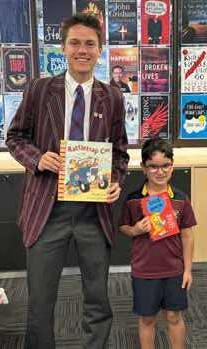
Despite Ag Day unfortunately being cancelled due to forecasted inclement weather, it did not stop us from celebrating our boarding community. Throughout Boarding Week, there were a variety of boarding-themed activities including a tug-of-war against a tractor, bubble soccer between the day boys and boarders as well as an epic Scotch vs PLC Boarders’ netball match. To finish the week, we had a farm-themed free dress day where the boarders marched as their own House. It was truly a spectacular week, and it was fantastic to celebrate such an integral part of our Scotch community.
In Autumn Term, the arts were certainly on full display. After countless hours of rehearsal, the Senior School boys, in collaboration with our sister school, PLC, brought the production, School of Rock, The Musical to life. From laugh-out-loud moments to terrific singing pieces, this musical had it all. It was obvious to see just how much effort and time was put into the making of six professional performances, which were all nearly sold out. In the final week of Autumn Term, we also celebrated the arts through the Senior School Arts Day. In the morning, the boys’ artistic knowledge was put to the test in the Spicks and Specks art quiz. From there, the boys battled it out in theatre sports, earning points
for their House through a series of drama games. After that, we split off into our chosen workshops which included Indigenous arts, hip hop dancing, stage combat and much more. At lunch, some students rocked out in the famous Battle of the Bands while others made the most of the food trucks on offer. In the afternoon, the boys competed in the much-anticipated House Singing. It was fantastic to see boys stepping out of their comfort zones to sing for their House and a huge congratulations to Anderson House, who won with their rendition of Coldplay’s hit song Viva La Vida
As a College, in Winter Term, we also celebrated NAIDOC Week. Throughout the week, the Scotch College Indigenous Network students performed a variety of cultural dances for each of the three subschools. During the marching on the Friday, we were also treated to a smoking ceremony by Uncle Barry Winmar who later performed the Welcome to Country.
It is hard to believe just how quickly this past semester has flown by. I would like to thank all the parents, staff and students involved in the making of such an incredible semester. I think I speak on behalf of the whole Year 12 cohort when I say that this year has provided memories we will cherish for a lifetime.

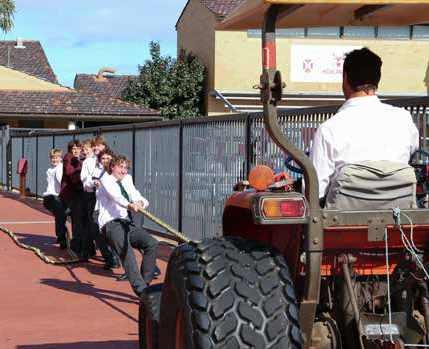
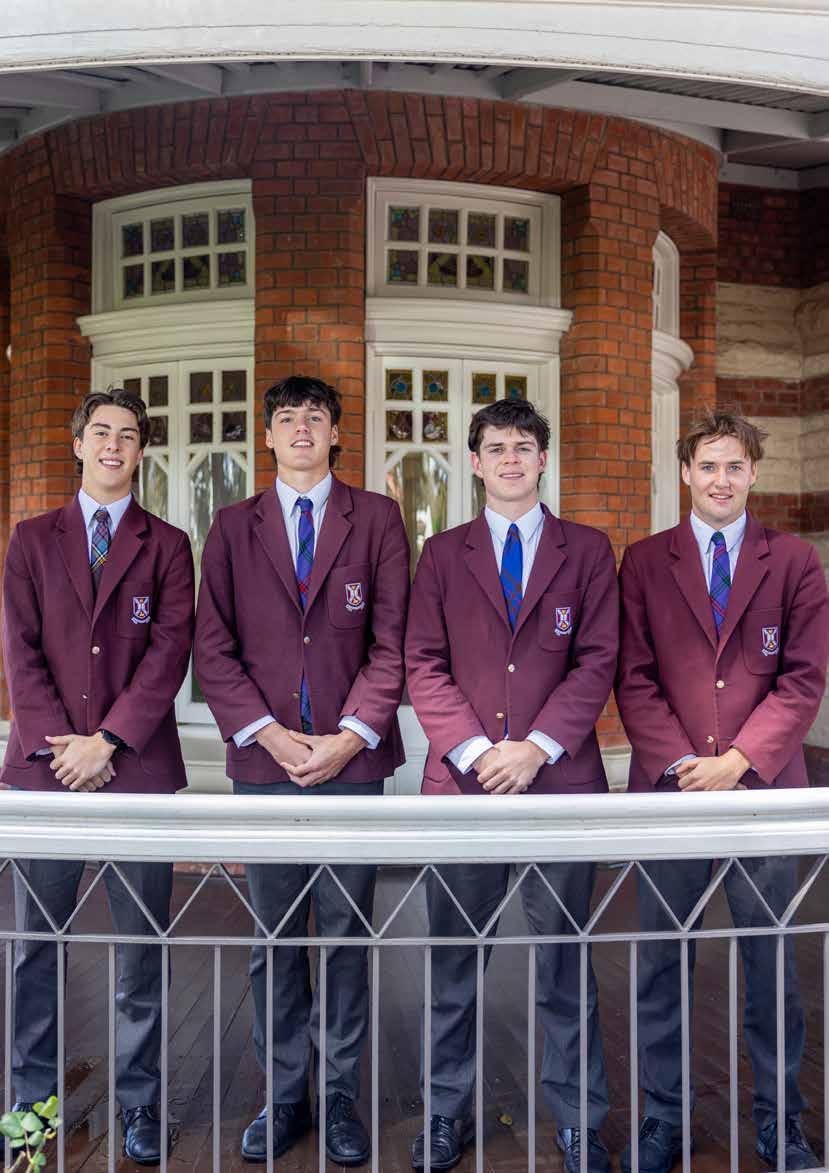
Being a leader is about inspiring those around you to be better versions of themselves.
Val Davies Captain of School
I started my journey at Scotch in Year 6. I had boundless energy and a love for sports. I quickly fell in love with Scotch, drawn to its remarkable playing fields and endless opportunities. Surrounded by supportive teachers, I was encouraged to explore new interests, including the arts. I learned to play the guitar and continue to enjoy playing it today.
I vividly remember the moment I first felt truly proud to be a Scotch boy. Early in my time here, I was fortunate to participate in the PSA swimming and athletics carnivals. Watching the older boys, whether singing in the stands or giving their all in the pool or on the track, instilled in me a deep sense of belonging and pride. These experiences highlighted what I believe Scotch represents: a community where we all share in the pride of being part of the school.
What inspired you to take on the leadership role this year, and what do you believe is the most important role of our School Captain?
Scotch has provided me with countless opportunities to learn, grow, and connect. I want to give back by helping shape the school’s future and creating an environment where everyone can thrive.
To me, being Captain is about embodying our school’s spirit and celebrating what makes Scotch unique – our traditions, values, and the strong sense of community we share. Every leader has their own style, and I aim to be an approachable Captain. I see this as one of my most important roles –supporting my peers whether they need help with challenges, have new ideas, or just want to chat. My hope is that every boy feels like the integral part of the Scotch story they are, and together we can build on the strong foundations of what makes Scotch so special.
Charlie Banfield Vice-Captain of School (Operations)
My Scotch story started back in 2019 as a Year 7. From a young age, having seen my family’s connection with the College, it has always been my dream to join this remarkable school. I have thoroughly enjoyed the past five years, appreciating the opportunities to learn, the friends I’ve made, and my passion for sport and other co-curricular activities.
I have been fortunate to represent the 1st team in AFL and Basketball in 2024 and am currently undertaking five ATAR subjects, which I will continue into my Year 12 journey. At Scotch, there are so many opportunities to develop your leadership skills. What is one impactful activity/ experience that has shaped you as a leader?
Throughout my time at Scotch, I have had numerous opportunities to develop my leadership skills. This growth has mainly come from the guidance of teachers and older students, who have allowed me to model their example and follow in their footsteps to become the best leader I can be.
Many activities and experiences have shaped me as a leader today, including being part of high-level sporting teams, which have enhanced my teamwork and collaboration skills. The opportunity to go on the New Zealand trip in Year 10 was particularly significant, as it tested skills such as organisation, patience, and listening. Finally, Leadership Day provided me with new avenues to lead and succeed. These are just a few of the many activities and experiences that have truly shaped me into the leader I am today.
Seb Carmichael Vice-Captain of School (Service)
I started my journey at Scotch in Year 4 and was instantly welcomed into the community, finding a great sense of belonging and meeting lifelong friends for the first time. During my time at the College, I have been offered many opportunities to build myself as a person and reach my full potential. Every day has been filled with new experiences and encounters. I have thoroughly enjoyed my time at Scotch and look forward to what my final year has to offer.
Service, here at Scotch, plays a huge role in your schooling. Tell us about one service activity that has had a major impact on you. What did you learn from this?
At Scotch, service plays a large role in our everyday lives, and there are so many opportunities to give back to our community. The Soup Kitchen, Knitting for the Homeless, and the Year 10 service programme, where boys must complete 60 hours of community work, are just a few of the opportunities we are fortunate enough to participate in.
The service activity that has had the most profound impact on me is All Abilities Cricket at Claremont-Nedlands Cricket Club. As a passionate cricketer, this has been a hugely rewarding experience and something I look forward to each season. I have been involved in this programme for two years now, and it has taught me that no matter how hard the journey may be, there is always a way to do the things you love. The lessons I have learned from my experiences in community service are invaluable, and it’s something I recommend all Scotch boys continue to engage with during their time at the College.
I began my Scotch journey in 2020 as an eager but nervous Year 7 boarder. Since my first day, Boarding has been my homeaway-from-home with the amazing Boarding staff guiding and encouraging all of us into young men. For most boarders, moving away from family can feel frightening, but quickly connecting with friends can help ease emotions.
Having experienced boarding at Scotch, what is some advice you would give to our incoming boarders?
The strong relationships and unforgettable memories that I have developed have undoubtedly impacted my time here at Scotch. Building strong bonds and relationships with the other boys in the House is an important aspect of boarding. Having good friends by your side helps you overcome the challenges of leaving home while creating wonderful memories and friendships that last a lifetime.
My advice to incoming boarders is to put themselves out there and seize any opportunities that come their way. Regional communities cannot offer what Scotch can, so make the most of it and remember to have fun! Whether it’s trying a new sport or playing a musical instrument – give it a go. You’ll never know if you like it unless you try.
Mrs Maria Hodges Head of Junior School
With the opening of a second Pre-Primary class in 2025, Head of Junior School, Maria Hodges, explains what sets the Scotch Pre-Primary experience ahead of others.
Scotch College Pre-Primary stands as a beacon of excellence in early childhood education, particularly for young boys on the cusp of their educational journey. At the heart of its ethos is the ignition of a lifelong passion for learning. The school’s innovative approach is designed to spark curiosity and a sense of wonder in students, setting them on a path of discovery and enthusiasm for knowledge that extends well beyond their primary years. Utilising the renowned International Baccalaureate (IB) framework, Scotch College Pre-Primary integrates global perspectives with real-world contexts, offering a curriculum that is both meaningful and expansive. This approach not only broadens the horizons of young minds but also instils a robust foundation for intellectual and emotional growth.
The school’s commitment to catering specifically to the developmental needs of boys is evident in its tailored programmes that recognise the unique ways in which boys learn and grow. With a focus on hands-on, engaging learning experiences, students are encouraged to explore, investigate, and play, fostering independent thought and a proactive attitude towards learning. The nature-based learning experiences, such as Bush School at our on-campus specifically designed bush school, further enhance this by providing an environment that nurtures a child’s innate sense of wonder, exploration and encourages a responsible attitude towards the world they inhabit.
Scotch College Pre-Primary’s dedication to early learning extends to its support network, which ensures that each child’s individual needs and learning styles are met with innovative teaching methods. This attentive
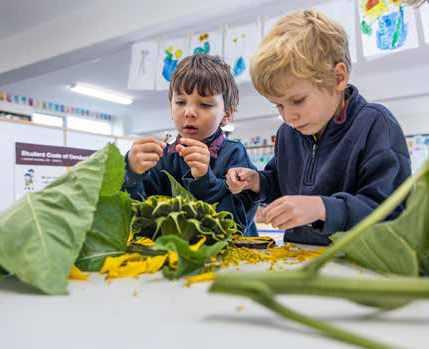
approach is crucial in enabling students to thrive not just in the junior years but as they progress through their educational journey.
The school’s developmental philosophy acknowledges that boys mature at different rates, providing a broad-based curriculum that nurtures them through this critical stage with numerous intellectual, physical, and creative opportunities. This is the time most crucial to ensure each student has the foundations in place on which they can build – getting it right here is vital and cannot be underestimated.
The integration of the IB Primary Years Programme (PYP) within the Australian Curriculum at Scotch College, is a testament to the school’s forward-thinking approach. The PYP framework fosters curiosity about the world and encourages students to pursue areas of interest in their learning, which aligns perfectly with the school’s objective to provide a stimulating and appropriate school curriculum. This curriculum is designed to benefit young learners at a time when their brains are optimally programmed to absorb new experiences, acknowledging that young learners are intelligent, resourceful, and creative individuals who develop and learn at different rates.
Moreover, the school’s substantial Academic Support team plays a pivotal role in eliminating learning gaps and providing challenges and enrichment opportunities, ensuring that every student can reach their full potential. This comprehensive support system is a cornerstone of the school’s philosophy, reflecting its commitment to nurturing each child to become their best self.
Scotch College Pre-Primary offers an unparalleled early learning experience that is tailored to the specific needs of boys. Its integration of the IB framework within a nurturing, inquiry-based environment ensures that students are not only prepared for the academic challenges ahead but are also equipped with the skills and confidence to navigate the complexities of the real world.
The School’s focus on igniting a passion for learning, fostering wonder, and providing a meaningful curriculum that connects with the real world makes it an ideal choice for parents seeking a holistic and enriching education for their sons. To truly appreciate the unique offerings of Scotch College Pre-Primary, I invite you to arrange a tour and witness firsthand the dynamic environment that awaits every young learner.

Mr Warwick Norman

In the Scotch College Junior School, we believe that the effective communication of our educational and pastoral programmes is a key factor in ensuring the bond between family and school remains strong and united.
The Head of our Junior School, Maria Hodges, has been running parent workshops, known colloquially as ‘CCCs’ (Conversations, Coffee & Curriculum) for the past three years.
The workshops have been an opportunity for our families to hear about the programmes
we run at Scotch with the sessions being run predominantly by Maria Hodges and myself, the Junior School Deputy, Teaching and Learning, along with special guests such as our Junior School psychologist, Jon Marginis.
This year we have decided to introduce two new elements to the CCC, that are designed to share our programmes with a wider audience, as well as invite our own teachers to run specific workshops, in areas where they have skill and passion, so that our parents, and wider community, can see how amazing our Junior School teachers are.
The free parent and local community engagement workshop include sharing in coffee and morning tea, while engaging in some educational conversations based on our teaching and learning programme. The workshops are usually held on a Tuesday morning between 8:45am –9:45am in the Gooch Pavilion. All schedule details can be accessed via the Scotch College website.
Maria Hodges and I will host all CCC events, however the presenters for our CCC mornings have been opened up considerably, as we explore a variety of topics including, but not limited to:
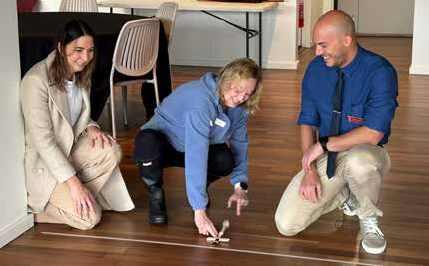
• Parents new to Primary Years Programme (PYP)
Warwick Norman, the JS Deputy, Teaching & Learning
• Protective Behaviours
Jon Marginis, the JS Psychologist
• Continuous Reporting
Maria Hodges, Head of the Junior School
• Early Years Literacy
Angie Myler, Head of Academic Support, Ash Lazarus, Pre-Primary teacher & Michelle Scarvaci, Academic Support teacher, the JS Psychologist
• Inquiry-Based Spelling
Jon Marginis, the JS Psychologist
• Year 5 PYP Exhibition
Warwick Norman, the JS Deputy, Teaching & Learning
• Inquiry Approach to Learning
Warwick Norman, the JS Deputy, Teaching & Learning
• Nature School
Daniel Burton, Chief Executive Officer of Educated by Nature
• Using Technology to Create Phoebe Behiels, ILT Integrationist
• Support and Enrichment Programmes
Angie Myler, Head of Academic Support
Please come and join Maria and I for a coffee, pastries, and rich conversation as we share all things educational from the Land of Scotch College.

Each year, we invite a group of talented Year 6 and Year 7 students to attend the Young Writers’ Collective, held in Fremantle, Western Australia.
We ask Year 8 students to write an expression of interest so that we have a range of talented and motivated students attend the once-a-term event. Each year, we have about 20 Middle School students involved.
The workshop celebrates the creativity and talent of emerging writers by bringing together enthusiastic students from across Perth, creating a dynamic space for inspiration, learning, and networking. The old Fremantle prison hospital, known for its rich cultural and historical heritage provides the perfect backdrop for the event. The workshop features a diverse range of activities designed to engage and empower young writers. The day is led by esteemed authors who offer insights into various aspects of writing, from character development to plot structuring to cartooning to the intricacies of publishing in the digital age, across a range of genres including fiction, poetry, and non-fiction, allowing students to delve into specific areas of interest over the course of the year.
A different author hosts the event each term. This year Dianne Wolfer, known for her historical fiction, engaged the Year 6 group in the first term. James Foley, known for his graphic novels will inspire the 6s in the upcoming term. Kathryn Lefroy led the Year 7 and 8s through screenwriting in the first term. Bren McDibble had the students dabble in cli-sci-fi (climate science fiction). The personal anecdotes and professional wisdom resonate deeply with students, encouraging them to find their unique voices and persevere through the challenges of the writing journey.
For many young writers, the Young Writers’ Collective is more than just a fun day ‘off’ school; it is an experience that inspires them to continue honing their craft. As the day ends, there’s a palpable sense of excitement and motivation, with many students already looking forward to next term’s conference.
“The Young Writers’ Collective is an amazing opportunity and I’m so grateful I’ve been able to attend. I love meeting new people and learning how each author writes. My favourite author has been Barry Johnsberg. He was incredibly entertaining and I’m still talking about his “class” to this day. I would highly recommend Young Writers to anyone who asks, and I can’t wait for the next one.” James Ackerman, Year 8
“The Young Writers sessions are a nice break from normal school routine. It’s also good to have the opportunity to learn writing skills and techniques from people whose profession it is. I have learned how to be spontaneous and creative with my writing ideas and I look forward to the next session.”
Jake Ognesis, Year 7
Ashleigh Civiello, English and Humanities Teacher
Renae Cirillo, Assistant Curriculum Leader –English | English & Humanities Teacher
During Week 11 of the Autumn Term, Year 6 students celebrated their IDU Week.
IDU, which stands for Interdisciplinary Unit, provides a unique opportunity for students to combine their learning content from two or more subjects to create a fun and creative product.
As part of the International Baccalaureate (IB) Middle Years Programme (MYP), IB World Schools like Scotch College are required to engage students in at least one collaboratively planned interdisciplinary unit per year. These units are designed to weave together the content of different subject courses, integrating disciplinary knowledge in innovative and meaningful ways.
Throughout the week, teachers from various subjects within the Middle School collaborated to bring their skills, knowledge, and expertise to the forefront, creating an enriching experience for our Year 6 students.
This year, the focus of IDU Week was on Science and Maths, and it served as an introduction to the boys’ Science Fair in the Winter Term.
As part of the IDU Week activities, in addition to taking part in a variety of science and numeracy activities, all Year 6 students embarked on an exciting excursion to SciTech, where they had the opportunity to engage with interactive exhibits and participate in hands-on workshops that complemented their classroom learning. These workshops included everything from physics experiments to mathematical puzzles, designed to stimulate curiosity and deepen understanding.
Experiences like IDU Week and the excursion to SciTech play a crucial role in enhancing the educational journey of our students, encouraging them to see the connections between different areas of knowledge and inspiring them to think creatively and critically. By combining theoretical learning with practical application, students not only solidify their knowledge but also develop a love for learning that transcends the classroom.
“My favourite part of the IDU week was when we went to SciTech. We did so many interactive activities and it was a lot of fun. My favourite SciTech activity was the planetarium because we were able to see and understand the solar system in a 360-degree room.” Jeter Lee
“I enjoyed IDU week because we got to do lots of science experiments, including popping balloons full of helium.”
Jack Dodds
Mr Michael Campbell, Year 6 Coordinator | Mathematics & Science Teacher
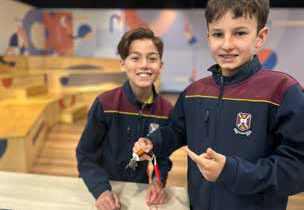


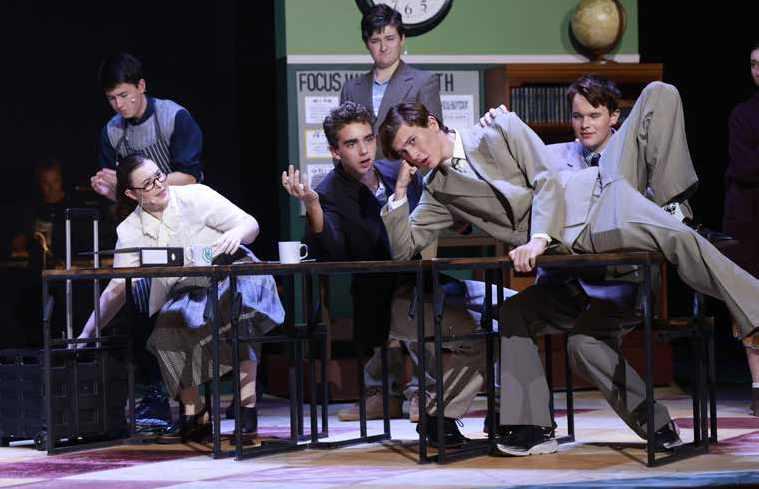

At Scotch we are proud to offer a choice of academic pathways.
As well as the WA Certificate of Education, we are proud to be a World IB school. Brendan Zani, IB Diploma Coordinator, explains what the IB is all about and helps us bust some myths around the programme.
What is the IB Diploma?
Now in its 15th year at Scotch, the International Baccalaureate Diploma Programme (IB DP) offers an engaging two-year journey for students in Year 11 and Year 12, designed to ignite their intellectual curiosity and prepare them for the adventures of university and beyond. This dynamic curriculum challenges students to think critically and globally, fostering a passion for learning and personal growth.
The IB Diploma is one of the three academic pathways Scotch offers to upper secondary students. The programme is recognised by universities across Australia and around the world. It offers students wonderful preparation for university, providing an education with breadth and depth, where they address realworld problems and exercise genuine choice in pursuing research topics aligning with their interests.
How do the subjects work?
In the IB Diploma, students study six subjects across two years. Part of the IB Diploma is its roundedness, and for that reason, students pick a subject from each of the following groups:
• Group 1: Studies of Language & Literature (English or Literature)
• Group 2: Language Acquisition (a second language)
• Group 3: Individuals & Societies (the human sciences)
• Group 4: Science
• Group 5: Mathematics
• Group 6 or other: The Arts (or another from Group 3 or 4)
Students take three of those subjects at Higher Level, and three at Standard Level. Higher Level subjects dive deeper, and students are encouraged to take the subjects where they are strongest or those in which they are most engaged at Higher Level.
What makes it different?
Being a different curriculum, it works a bit differently to the Western Australian Certificate of Education (WACE) and the academic pathway that leads to university study (ATAR).
Those distinctive features, which are explained below, are a big part of why we are proud to offer the IB Diploma as a pathway opportunity for our students:

Extended Essay (EE)
Over the course of a year, students work with a supervisor to undertake a major research project. They are taught how to do literature reviews, develop research methods, select analytical tools, analyse data, and produce meaningful findings. Students work with their supervisor to develop a topic of their choice. As they work through the project, students mature and transform, developing expertise and an academic toolkit that lay the foundations for university studies and beyond.
Theory of Knowledge (TOK)
In TOK, students reflect on the knowledge, beliefs and opinions that they have built up from their years of academic studies and their lives outside the classroom. The course is intended to be challenging and thoughtprovoking as well as empowering.
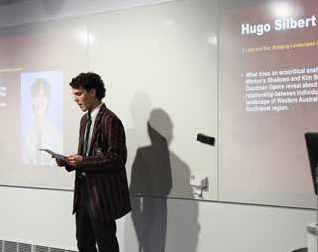
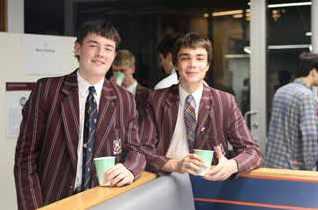
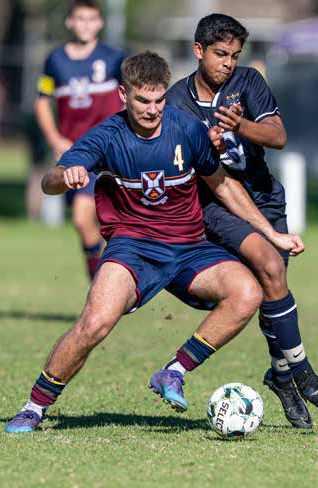

It’s a course that doesn’t require background knowledge or any expertise in philosophy. What it does do, though, is look at the methods by which knowledge is produced, and equips students to consider the factors that shape knowledge and its reliability.
Creativity, Activity & Service (CAS)
The CAS component of the IB Diploma promotes personal and interpersonal development through creative projects, physical activities, and community service.
CAS complements an IB academic programme in a holistic way, providing opportunities for self-determination, collaboration, accomplishment and enjoyment. The programme focuses on developing new skills, alongside students’ understanding of their own strengths and weaknesses, their communication, initiative and planning, and collaboration.
Students also consider global issues and the ethics of their choices and actions.
Why would I choose the IB Pathway?
Choosing the IB Diploma Programme for Year 11 and 12 can provide you with a rigorous and globally recognized education that prepares you well for university. It offers a broad range of subjects, encouraging a wellrounded academic experience and fostering critical thinking skills. Additionally, the IB DP emphasises international-mindedness
and community service, nurturing a deeper understanding of global issues and perspectives.
Myth Buster #1
Do I have to be the smartest kid in class to consider the IB?
You don’t need to be top of the class to do the IBDP because it values a diverse range of skills and interests, not just academic excellence. The programme is designed to develop well-rounded individuals by encouraging creativity, critical thinking, and global awareness, making it accessible to students with various strengths and passions.
Myth Buster #2
Is the IB a much harder pathway?
The IB Diploma is not inherently harder than other pathways, it’s simply different. While IB emphasises a holistic education with a focus on global perspectives, critical thinking, and a broad range of subjects, ATAR is more flexible, allowing students to specialize earlier. Success in either system depends on individual learning styles and preferences. The effort you invest in choosing what to pursue will significantly shape your learning outcomes.
It offers students wonderful preparation for university, providing an education with breadth and depth, where they address real-world problems and exercise genuine choice in pursuing research topics aligning with their interests.

Myth Buster #3
How will I manage both the IB and my extracurricular activities and commitments?
Balancing the IB Diploma and extracurricular activities can be challenging, but effective time management and prioritisation can help. Create a schedule to allocate time for studying and activities, stay organized, and avoid procrastination to reduce stress. Communicate with teachers and coaches for support and ensure you take care of your health to maintain your productivity. Across 15 years, students have successfully balanced the IB Diploma with elite sport and music commitments, as well as leadership roles, school productions, debating, and all the other bits that make a Scotch education a rich experience!

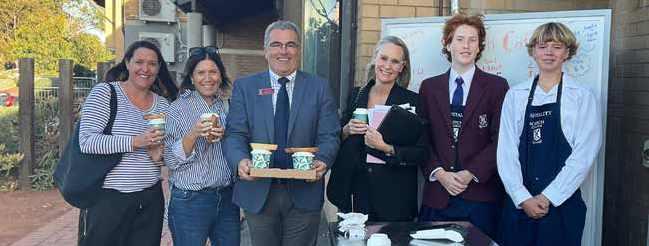
Mrs Annelise Luton
Last term, we were thrilled to spotlight the efforts of our Year 11 and 12 students who are running the student café.
Opened in Term 2, this initiative is more than just a place to grab a coffee; it’s a dynamic learning environment where our students are earning their Certificate II in Hospitality.
The café serves as a practical application of the 12 units within the Hospitality course, creating a realistic, holistic approach to learning. By working in the café, students gain hands-on experience in various aspects of hospitality, from mastering the Barista unit to effectively communicating and working with others. Our students also learn the importance of sensitivity and respect towards people of all ages, genders, and cultures through daily interactions with customers. Safety and hygiene are top priorities in our café. Every student must complete their Work Safe and Hygienic Practices qualifications before they can participate. This ensures that all the delicious items they prepare are made in a safe and clean environment.
The students craft all the menu items, which include popular treats like warmed-up banana bread, sweet and savoury muffins,
caramel slice, lemon slice, and a delightful biscotti that accompanies every hot drink. This winter term, we are excited to introduce new additions to the menu: waffles and a breakfast tart.
The café is open every Monday and Tuesday from 7 am to 8 am, offering a warm and inviting space for the Scotch community to enjoy. The students take pride in their work and would love to see more of you there, not only to serve but to connect and gain valuable customer service experience.
We look forward to seeing you at the café soon. Your support not only satisfies your taste buds but also enriches our students’ educational journey.
What inspired you to participate in the Certificate II in Hospitality?
I was inspired to join the Cert II in Hospitality because of the benefits that come from it.
Barista license, RSA and First Aid Certificates are all qualifications you will get simply through completing the course. Having these qualifications will be greatly beneficial not only for your CV, but also for understanding how to perform certain tasks of high importance and significance such as CPR. And, you will be able to make a good coffee, and responsibly serve alcohol. Will Henderson, Year 11
Can you describe your typical day at the café from start to finish?
The beginning of my day, before my café shift, involves waking up at 5:00 am. During winter, it has sometimes been raining, and riding my e-bike to school has been a challenge, but it is well worth it when I arrive. As soon as we walk through the door, we heat up the coffee machines and follow the procedure to ensure they are all good to make coffee. We then set up the outside table with the card reader and sweet treats that we sell along with the coffee.
Throughout the morning, we sell coffee to teachers, students, and parents. I would say the café is the best part of my day because of the fun I have with all my mates. To finish the café shift, we clean all the equipment and make sure we leave everything better than we found it. Zach Fredericks, Year 11
Which skills have you found most valuable while working in the café? While working in the café, I have found it has improved my interpersonal skills, barista skills, and overall time management in how I complete tasks. This is evident in how I perceive my work ethic during opening times, as I can converse with customers openly without any problems, starting by asking how they are that day. Then, when I’m manning the coffee machine, I’m able to create beverages that always satisfy our customers. Additionally, I can make coffees efficiently by using my time wisely. Therefore, I believe that the café program has allowed me to gain these skills, which will serve me throughout my life and career, and will enable me to succeed in all my future endeavours. Alex Edelman, Year 11

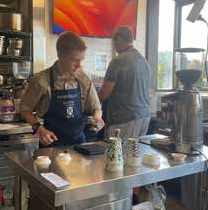

Ms Gill Youngleson Head of Inclusive

more helpful to consider the simple question: what is best for this learner?
The shift towards focusing on individual needs, parent empowerment and choice, as well as addressing learning needs through a curriculum lens, instruction, and contextual supports, offers the best chance of maximising outcomes for all students and ensuring equal access to learning.
The Universal Design for Learning (UDL) principles embody these concepts.
reflections and insights as a school student with attention deficit hyperactivity disorder (ADHD). Last term Middle School dedicated an assembly to the concept of Inclusivity and welcomed guest speakers Harry Nicholls (Year 10 Scotch) to tell his story as well as Nick Ryan who has a diagnosis of Cerebral Palsy and shared his uplifting story of resilience and the importance of striving for an equitable society where all can thrive.
Various models for educating students with disabilities, including exclusion, segregation, and integration models, preceded the Inclusive Education (IE) model.
The term “IE” was coined during the 1980s and 1990s and has gained momentum since. In its purest form, the IE model is based on the view that local state schools should cater to the diverse needs of all students, regardless of disability, within a mainstream setting, providing appropriate and personalised learning supports.
Inclusive Education is not without its challenges. Literature asserts that it is a resource-heavy model, requiring specialist support teachers within mainstream classes, education assistants, and time to develop appropriate, evidence-based, and engaging resources for all students to access the curriculum. Moreover, it is argued that inclusive classrooms may not always be the best way to include all students in the learning process – whose needs are really being met?

Rather than looking at education models based on environmental settings, it is
Scotch College embraces the ethos and principles of inclusivity and sees it as the responsibility of all teachers. To this end, at the recent Curriculum Leaders’ Retreat, we engaged in professional learning on UDL and how to incorporate these principles into the planning, delivery, and assessment of teaching units so that we are proactively rather than retroactively planning individualised adjustments. Furthermore, restructuring and rebranding the Academic Support model (going forward, the Inclusive Education Department) across Years 6-12 so that vital knowledge of students is shared more effectively, transition of students across sub-schools is more seamless and teachers are more aware of the intricacies and complexities within each sub-school, has been a recent development.
Some of the Inclusive Education events at Scotch College in the past year have included an incursion from the Youth Advisory Committee (YAC) at Spectrum Space on World Autism Day to speak to Middle School students about Autism, and what it is like to be Autistic. We had an extremely positive response both from students and parents to this event. In addition, Sam Sterrett (Head of K-12 Enrichment) interviewed anaesthetist and Brain Injury advocate, Dr Bruce Powell in The Range Project, on his experiences,
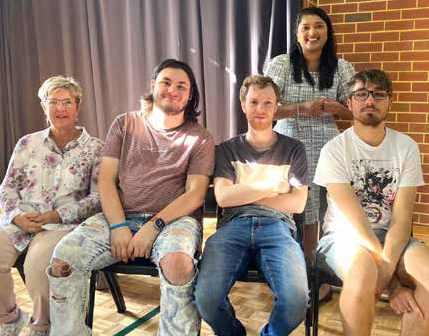
Finally, Senior School recently hosted an event for Oqea who arranged Professor David Coghill, Chair of Developmental Health at the University of Melbourne and President of the Australian ADHD Professionals Association, to present on the latest ADHD research and best practice. There was also a panel discussion and Q&A, and this was attended by many parents. Inclusive Education teachers have also presented to all staff and shared information on how each sub school practises inclusion and how this may look different across sub-schools to be age and stage appropriate.
Finally, inclusive education goes beyond learning disabilities and curriculum access. It also encompasses how well the contributions, presence, and perspectives of different groups of students are valued and integrated into the learning environment. Diversity recognises that every student and their experiences is unique and that within a class, different learning preferences and teaching styles need to be incorporated. At Scotch College, we strongly believe that if students feel a sense of belonging and recognition as individuals, they are more likely to succeed socially, academically, and personally. Moreover, embracing inclusion and diversity within a school inspires acceptance and helps prepare students to prosper in an exponentially diverse world.

“Inclusive education goes beyond learning disabilities and curriculum access.”
Arthur-Kelly, M., & Foreman, P. (2020). Inclusive and Special Education in Australia. In Oxford Research Encyclopedia of Education
The Enrichment Programme provides our most academically able students with rich, challenging, learning opportunities beyond the mainstream curriculum. The programme is designed to offer depth and breadth of opportunity in support of our students’ many passions and interests.
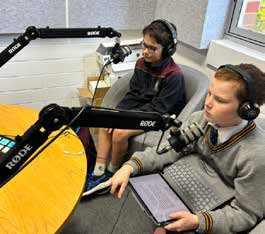
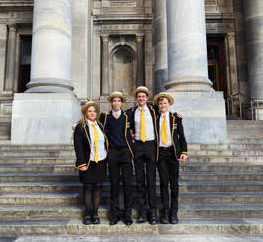
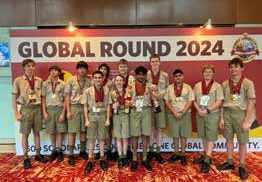
In Term 2 a group of Middle School students had the opportunity to visit the Curtin University’s Space Science and Technology Centre. We met the team at the BINAR Space Program and the engineers who are currently building CubeSat satellites (10 cm X 10cm in size) to be launched from rockets while these are on their way to space. We also had the opportunity to tour the satellite manufacturing facilities and finished the day listening to a lecture about the future of space travel by NASA’s Director of the Jet Propulsion Lab, Professor Laurie Leshin. A particular highlight was making a podcast reflecting on our experience. It gave us an opportunity to enhance our knowledge and feed our interests. Overall, it was an amazing experience that we all greatly enjoyed.
Isaac Simpson, Year 7
Earlier this year, I was fortunate to be selected as one of four students to represent Western Australia in the National Schools Debating Championships. After six weeks of intensive training, the team travelled to Adelaide to debate against each state and territory. With topics including the introduction of maximum age for members of parliament and whether the AUKUS submarine deal was a failure, it was a challenging, enriching and rewarding experience debating against high-level opponents from all over Australia. We were also honoured to be hosted by the Governor of South Australia at Government House, as well as the opportunity to debate in the State Parliament of South Australia. Although the WA team did not progress to the Grand Final, we had some solid wins and honourable losses. Overall, it was a fantastic experience and one that I hope to be selected for again in 2025.
Jack Mayo, Year 10
The World Scholars’ Cup Global Round is a thrilling and intellectually spurring competition that spans over four intense days. We engage in various activities, including debating and collaborative writing. Then there is the Scholar’s Bowl, a quiz typically taken with your teammates and a few thousand people and there is also the Scholar’s Challenge, a 120-question test that, unfortunately isn’t with your teammates. However, this would be a superficial description of The World Scholars’ Cup. This programme immerses you in a massive, thriving community of like-minded people, you make friends, learn about different cultures and talk to people who are so different but are all united by their passion for knowledge. However, it offers much more. This year’s event took place in Kuala Lumpur where we had the opportunity to explore diverse and new surroundings, try unexplored foods, shop in the glamorous malls and stroll around the magnificent city of KL, but most importantly, make memories that last a lifetime. It’s not just an academic competition but a compelling opportunity to broaden your cultural horizons and explore new places.
Ishir Bhaduri, Year 9

Over the past 12 months, myself, and a team of 7 others had the opportunity to compete in a global competition called First Lego League. Judging from the title, you may come to believe that this is simply Lego, a childish game, though it is so much more. Each team is tasked with building a robot that must travel around a game-board and complete missions that often require highly engineered solutions and specialised programs. As well as robotics, First Lego League also requires you to create an innovative solution to a problem revolving the seasons topic, Masterpiece. Through this competition, we traveled across the globe to Norway where we met and made connection with people from all over the world. A truly amazing experience that I will never forget.
Lincoln Percy, Year 7
When I started First Lego League in Year 4, I did not think that it would lead to a trip to Florida! It took 40 hours on three planes and we finally arrived in Orlando, hitting the ground running. Beginning with Universal Studios, we were blown away by the number of rides. We were fortunate enough to explore the Kennedy Space Centre. The rockets “blew” us away! Another highlight was observing a SpaceX satellite launch! Then, the competition day arrived. Our robot, Bruce, battled it out on the game board against formidable opponents from around the world. We also presented our recycled denim acoustic panels to help combat sound and landfill. We were privileged enough to stay at the Embrey-Riddle Aeronautical University, and live the college life. We were so lucky to go on such an amazing journey. A huge thanks to Mr Wells and Mr Van Ingen-Kal for getting us there and taking care of us. These memories will last a lifetime.
Ethan Palassis, Year 7
Here is a snapshot of the journey that our two winners of the Scotch College Year 5 Speaker’s Challenge have taken. Hadleigh’s speech on “The evolution of dogs” and Flynn’s “How to prepare for your thirteen year old brother” made an impression on the judges. As they prepare to compete at the IPSHA Finals in September, they reflect upon their experiences to date.
How did you come up with your idea for a speech?
Hadleigh: “I heard my Mum talking to the dog in a baby voice and thought that she was being nicer to the dog than me! It seemed to be a good idea for a speech.”
Flynn: “I got my idea one morning when my brother was extremely grumpy, and it made me curious to see if I could find out why teenagers are always like this”
What were the class heats like?
Hadleigh: “I practised a lot, getting better each time. Sometimes my parents were watching me and other times I was practising in my bedroom and even to my dog! I practiced in the shower too because the acoustics were good in there.”
How was the school Final?
Flynn: “I was exhilarated when I heard the news that I had made IPSHA Finals. When I was on stage in the school finals, I just gave it my all and luckily my effort paid out as I came second. I am happy to know that I will be more confident when I speak at any upcoming events. I am beyond excited about sharing my speech again.”
How about the future?
Hadleigh: “I hope that public speaking will help me become a good lawyer because it will help me in court however first up, I want to do Debating and Mock Trials in Senior School.”
The future looks bright for Public Speaking at Scotch, and we wish Hadleigh and Flynn the best of luck in the upcoming IPSHA Finals.
Hadleigh Fulmer and Flynn Cockerill, Year 5
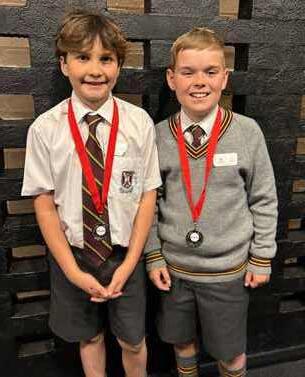
For over 10 years, Scholar in Residence, Akram Azimi, has been responsible for providing support to students and staff across a range of academic programmes. With a multi-disciplinary academic background and interests in neuroscience, law, sociology and philosophy and literature, Akram continues to provide incredible intellectual and pastoral mentorship for the boys.
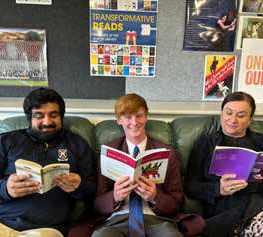
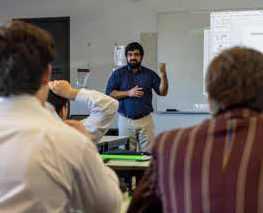
During an enrichment seminar organised by Dr Weeda, our Scholar in Residence Akram Azimi descended like a literary angel, preaching some of the knowledge of William Shakespeare’s play Macbeth which the Year 11 Literature cohort had just finished studying. Akram brought to life Macbeth’s inner turmoil and pursuit of masculine desires. From the misty Scottish moors to ancient courts, he guided us through the complex pathways of Macbeth’s mind, revealing his moral decay and vulnerability. Akram’s analysis explored Shakespeare’s observations on masculinity and natural order, drawing striking parallels to modern struggles for recognition and the vulnerabilities inherent in human ambition. Our passionate discourse highlighted the allure of darkness that seduces even the purest souls, forging connections between history and contemporary challenges. With rigour, Akram reignited the roaring flames of Macbeth, forging connections between history and our contemporary world, leaving an enduring impression on all who experienced this intellectual phenomenon.
Isaac Oddy, Year 11
With a passionate vigour, Akram shared his heartfelt reflections on The Kite Runner, weaving in the intricate history of Afghanistan. His poignant insights into the novel’s themes of redemption and hope resonated deeply, providing a glimpse into the struggles and triumphs of his homeland. Perhaps most admirably, Akram spoke from his heart, graciously and at times vulnerably, about topics of significant impact in his own life. Akram invited us to ponder the human capacity for forgiveness and the enduring spirit of a people, ascending beyond the sole character representations in the novel. We are deeply grateful for his enlightening and moving contribution to our class.
Rhama Evans, Year 12


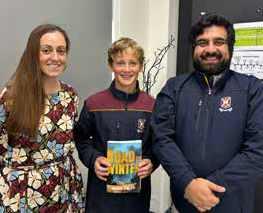
In Year 8, we’ve been reading The Road to Winter by Mark Smith and learning about refugees. In Week 3, we met Akram Azimi, who shared his asylum seeker experience to help us build a better understanding of the story’s context. From Afghanistan, Akram was born into a well-protected life due to his influential family. When his father was briefly jailed and later released, they quickly fled, joining thousands of asylum seekers. They reached a camp in Peshawar, Pakistan, and after years of applying, Australia offered them a chance to resettle. Although Akram’s cousins were not accepted, his family took the opportunity to start a new life. In Australia, Akram faced isolation but became a successful and hardworking individual. We enjoyed having the opportunity to learn about his story and have discussions to help us to understand the challenges faced by the asylum seeker characters in the novel.
Louis Gale, Year 8



Narelle Goodfield Head of Accelerate
In today’s rapidly evolving work landscape, employers seek agile staff who possess the ability to think on their feet, communicate confidently and thrive in diverse teams.
Following secondary education, students are progressing with degrees and tertiary education which provide knowledge and discipline. They are, however, frustrated by the significant gap between industry requirements and the practical skills required by employers.
The partners for this cohort’s programme came from diverse industries such as The AARP (Australian Automation and Robotics Precinct), the Australian Institute of Management Western Australia, digital marketing agency Bonfire, Starick (Domestic violence support services in Perth south east metro) and producers of environmentally friendly plastic alternatives, Uluu.
Our participants were tasked with exploring and presenting solutions on real business challenges, such as:
• How to communicate Uluu’s sustainability credentials in a way that stands out from all the greenwashing noise?
• Develop relatable messaging that will speak to young people about signs of coercive control in early relationships (Starick) and
• What strategic plan should be implemented to accelerate activation of the precinct from a youthful perspective (Australian Automation and Robotic Precinct)?

The recent Career Accelerator programme held at the Scotch College campus, was attended by 25 young adults between the ages of 18-25. The aim was to bridge this gap by equipping them with the essential real-life skills which will set them apart from other candidates.
This high-intensity residential programme, where students lived on campus for a week, demanded the best from the participants and the outcomes were nothing short of exceptional. Through an immersive experience of visiting organisations to get a view behind the scenes, mentoring and practical hands-on live projects, students not only had to work collaboratively to problem solve but were also required to deliver solutions to the programme’s business partners in real-time.
This challenge was supported by knowledge and expertise shared from industry leaders and our exceptional collaborators including Old Scotch Collegians such as Aaron McDonald, Michael Silbert and Alex Aberle-Leeming amongst other speakers who generously shared their time, skill, and professional experiences.
The students also developed lifelong skills of communication, negotiation, influence, selling or pitching a concept as well as much needed practical skills of resumé creation, mock interviews, personal brand development and professional social media positioning.
Thank you to the generosity, vision, leadership, and commitment to a Community for Life of the Old Scotch Collegians who, together with our business partners and mentors, allowed us to bring together such a successful programme.

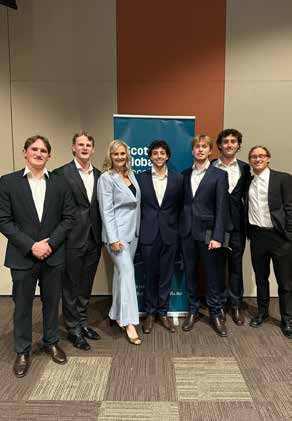
If your business needs a pipeline of young talented graduates, or if you are interested in partnering with us on future programmes, please get in touch with Narelle Goodfield, Head of Accelerate at Scotch Global 0409 431 079.


Six-days surrounded by fresh ideas of new talent, inspired by the generous perspectives of our exceptional industry leaders. I have loved learning more about the importance of teamwork and allowing us to achieve expected goals, further bridging the gap to meet employer demands.
Inspired by current industry leaders each day to think with confidence, question one’s personal brand and thrive within a team. I’m so thankful to have been part of this high-intensity transformative journey. Emma van Schouwen
Throughout the week, we were inspired by guest speakers from various organisations. I am incredibly thankful to learn from their setbacks, resilience and experiences which led them to their successful career pathways. Bryzlyn Sin
A truly amazing opportunity provided by Scotch Global. It was great to hear and connect with all the talented and successful individuals who addressed us throughout the week. Damian Haynes
Filled with industry leaders, practical labs and so much wisdom, the week was an amazing opportunity for growing confidence in myself, my skills, and my future. It was also incredible to meet so many people and make new friends Laura Cooke
Once again, the 2024 Winter Season, did not disappoint.
Rugby
In an exciting game that was basically a Grand Final between Scotch and Hale, our 1st XV rugby side secured the Br. Redmond Cup for the second year in a row with a narrow victory 21-17, making it an undefeated season for the team. Hale led late in the match, but a wonderful team try and subsequent conversion was enough to get the Scotch team home.
Our Cross-Country team finished second again this year, behind a Christ Church team who went through the season undefeated. Captains Lachlan Dauth and Jack Douglas worked hard to build a culture of hard work within the team, which had boys from Years 7-12 in it. Scotch won all their home-andaway races outside of the CCGS fixture and were second in the all-school and relay events.
The 1st XVIII football finished third this year in their quest to try and win the Alcock Cup for the 5th year in a row. It was a very compromised year for the team, with boys in the State U/18 and U/16 teams unavailable for key fixtures through the middle of the season, combined with a run of injuries to key players at the same time. Aquinas won the Alcock
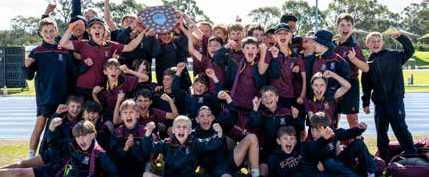
Cup with an 11-1 W/L record, with Hale second and Scotch third.
It was a 3rd place finish for our Hockey team this year under the guidance of Mr Ryan Jones. Christ Church won the Ray House Hockey Cup, with Hale 2nd. Our team showed we could match it with the top side, our draw with CCGS being the only points they dropped during the year.
It was a podium finish also for the 1st Soccer team, with Scotch finishing 3rd behind LaweDavies Trophy winners Christ Church, with Hale second. It was mixed season for our team, with some very strong wins, a couple of frustrating draws and a number of missed opportunities. Christian Melsom and the Year 12s kept good spirit within the group all season.
Our young 1st VI badminton team finished 4th this year, with Christ Church taking out the Br. Kelly Trophy. CCGS and Hale were the two standout schools, with CCGS winning both fixtures 5-4. Wesley and Scotch were clearly the next best schools, and Wesley just defeating us in both rounds, 5-4 and 6-3, with a bulk of these matches going to 3 sets. All of the Scotch team will return next year, and with coach Edmund Xu we will build on this year’s result.
And last but certainly not least, both the JPSSA and PSA Athletics carnival saw some fantastic results for Scotch athletes.
The Junior School boys left nothing in the tank and brought home the JPSSA Athletics Shield trophy for the second year.
The Middle and Senior School boys brought home the Alcock Shield for the seventh year in a row, a feat never accomplished in the history of PSA Athletics. Congratulations to all boys and to Luke Schaufler who broke the 2013 PSA U16 Shotput record.
Well done boys! We could not be prouder of the efforts and determination you showed throughout the season and on the day.
Our sport programme could not run without the support of the many coaches and managers. I thank them all for the time, effort and expertise they bring, on occasions during inclement conditions. Thanks also to all grounds staff, medical team, events team, bus drivers and student services for their help during the season to ensure Scotch provides a quality sporting product to our boys and larger community. Last but not least, thank you to the boys for the way in which you have conducted yourselves, making us proud of your results and of the excellent sportsman qualities that you have demonstrated throughout the season.
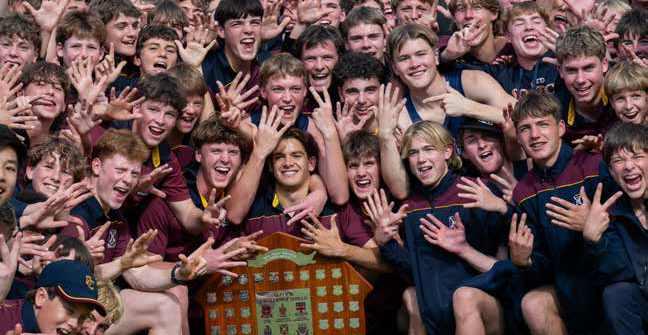
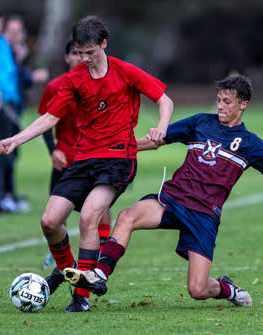
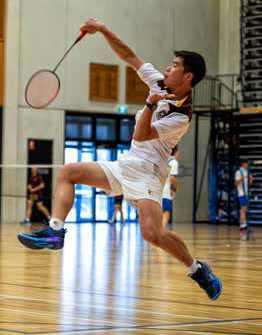
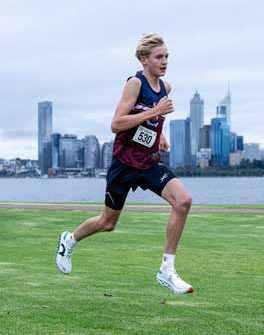
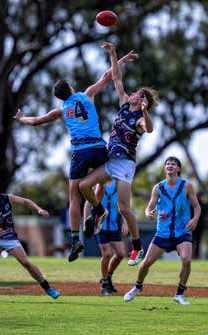
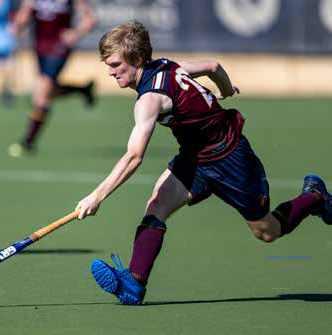
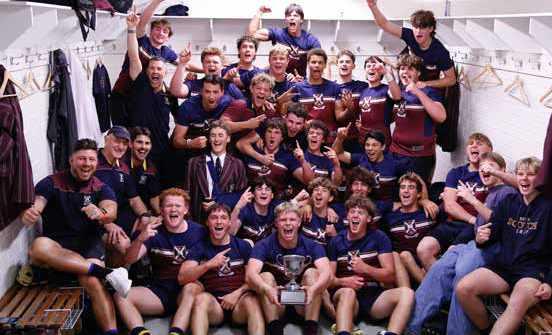
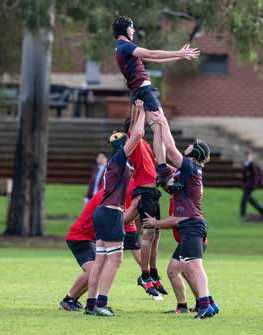



Max Thorpe Vice-Captain of School – Service
The major service initiative held last term was the Fight MND Big Freeze event.
The aim of the event was to raise funds through selling Big Freeze beanies and running a sausage sizzle at lunch time in the Senior School. In total we sold 152 beanies across the school, 70 in Senior School and 82 in Middle School, raising a total of $4,370. It was great to see the boys in both sub-schools show a huge level of support towards the cause.
This year in the Senior School we substituted the dunk tank of recent years for an ice plunge. What made the event particularly special was the huge crowd that gathered to support the teachers and Year 12 students who daringly took on the freezing cold ice plunge. A huge thanks to the Year 12 House Service Captains who helped run both the sausage sizzle and the ice plunge. Without their efforts the day would not have been anywhere near as impactful.
Fight MND is a cause that is particularly close to the College as Headmaster Bill Dickinson passed away from MND in 2006. Apart from the entertainment that the event provided, it was also a great opportunity to raise funds that will go directly to supporting MND research, assisting patients and raising awareness of this devastating disease.
Last term we also took part in the PushUp Challenge, an initiative that was first introduced last year. The Push-Up Challenge strives to create awareness for those who suffer from mental illness in Australia. Participating teams or individuals are required to complete 3,249 push-ups in 28 days, from the 5th to the 28th of June. This number is
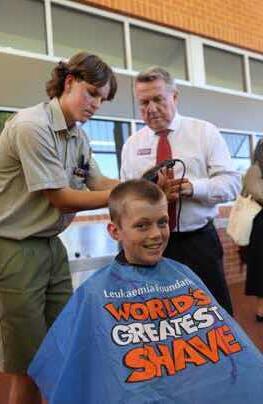

in recognition of the number of Australians who lost their lives to suicide in 2022. This year Scotch had 58 teams and over 300 boys participated in the challenge. The College completed a combined total of 335,164 pushups and raised over $4,330. Over the course of the four-week challenge, a series of pushup competitions were held on the Chapel Lawn during recess each Friday. These challenges created a great atmosphere and raised a lot of awareness for the cause. It was amazing to see the huge levels of support for this cause and yet again all three sub-schools displayed their eagerness to raise awareness and funds for a worthy cause.
Finally, World’s Greatest Shave organisers recently contacted us to let us know that Scotch College was the school who raised the most funds across Australia. Whilst we were happy to be at the top of the leaderboard, it is knowing that the funds we have raised will make an impact on the lives of those battling Leukaemia that makes us most proud. We are immensely grateful to all the boys across the sub-schools who raised funds and to the community who supported their efforts.
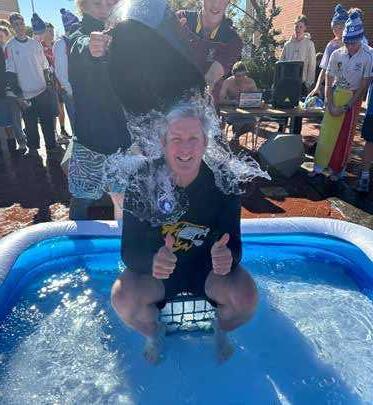

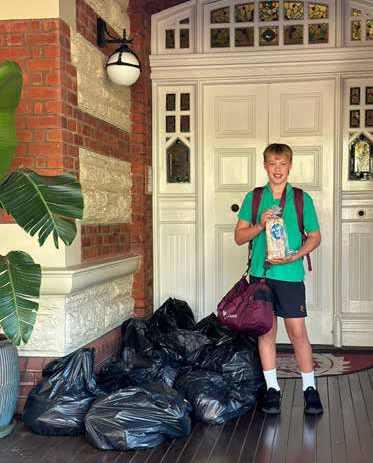

The Bread Run is a great opportunity for Scotch College students to participate in service. As a member of the Bread Run, I can say that it is a fun and worthy opportunity to volunteer a small amount of time to help those in need.
The Year 8 and Year 10 cohorts are both involved. The Year 8 parents and students work together to collect bread from the generous local Bakers Delight, Mosman Park (owned by Matt Frank) each Thursday evening and deliver a large amount of baked goods to Scotch College the next morning. The Year 10s then take it to the homeless shelter every Friday. The bread donated to the Salvation Army both prevents the waste of bread which must be baked and sold on the same day and helps feed those less fortunate. Knowing that our small effort ensures someone in need can enjoy a sandwich or a baked treat, makes us grateful for what we have.
A big thank you to Bakers Delight, Mosman Park, The Salvation Army and to Year 8 Parent Rep Sha Ragnauth for making this possible.
Ruben Ragnauth, Year 8
Scotch College was recently invited to participate in the ABC Give Write Stationery Stash initiative. As the only school present, the boys had a wonderful opportunity to serve a great cause while also experiencing how a radio studio works.
On the 26th of July 2024, the ABC (Australian Broadcasting Corporation) held a “Stationery Stash”, where stationery that had been donated to them by the public was sorted into bundle. The stationery will then be given out to students and teachers around the state by an organisation called Give Write.
We helped with testing markers and pencils and then bundled them up helping to create complete Give Write school packs, which will be given to students and teachers around WA.
We were given a tour of how the ABC podcast and radio works, and we were shown how everyone working there communicates during the programme. We got to test out the microphones and audio and learnt how the volunteers take and receive phone calls, and what the computers in the radio are used for.
We also met several well-known people and politicians; we met the leader of the Opposition in WA, Libby Mettam, the Mayor of Perth Basil Zempilas, CEO of Give Write Monica Smith and several radio hosts for ABC Radio. We even got to check out their recording studio with Nadia Mitsopoulos accompanying us!

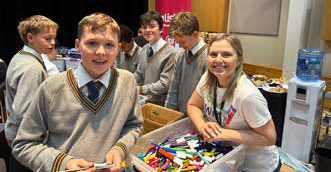

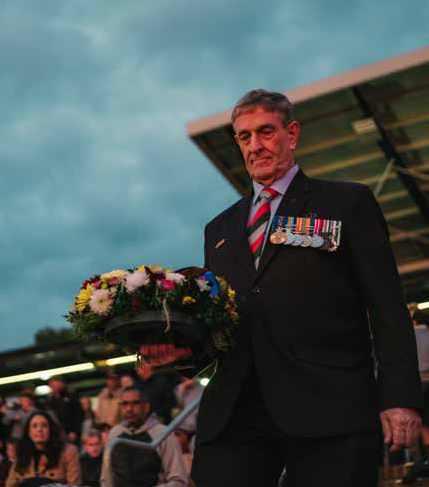

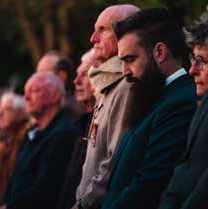
Mr James Hindle Director of Pastoral Care

We held our ANZAC Day Dawn Service on Thursday 25th April at the Memorial Ground.
The ground itself was built, partly by students, to commemorate the sacrifices made by Old Scotch Collegians during the First World War. 475 Old Boys enlisted, which was over half of all Old Boys at that time. A crowd of around 1200 sat in the Gooch Pavilion facing east as the horizon began to brighten.
This is a morning which offers us a small opportunity to pause and quietly give thanks. we have been fortunate to benefit from the sacrifices of many people over time. We owe a debt to them, even though their names may not be much more to us than a list on a wall or a plaque. It is also an opportunity to revisit an obligation we all carry: to be willing to defend the values of fairness and democracy through both our words and our deeds.
For me, the central message of ANZAC Day is that how we live our lives matters.
We were very fortunate to have the support of our Old Scotch Collegians for this event. Alex Pigneguy (OSC ‘23) played the bugle and Michael Silbert (OSC ‘79) read the Ode to the Fallen. We were also honoured to have Captain James Colmer deliver the ANZAC Day oration. He is a member of the SAS Regiment, based nearby at Campbell Barracks.
As the service finished, the sun rose across the playing fields, cockatoos began their chorus and many stayed to enjoy a coffee and a chat. Our Pipe Band also played, before they headed in to Perth to take part in the annual Parade.

ANZAC and Remembrance Days are now key annual whole-school events and we hope you will be able to join us at one or both of these special occasions.
I finish with these thoughts: we owe a debt of gratitude to our ancestors that can really only be repaid by how we live our lives, today and henceforward. The challenge for us is to strive to be good ancestors for our children and for those generations yet to be born.

“The challenge for us is to strive to be good ancestors for our children and for those generations yet to be born.”




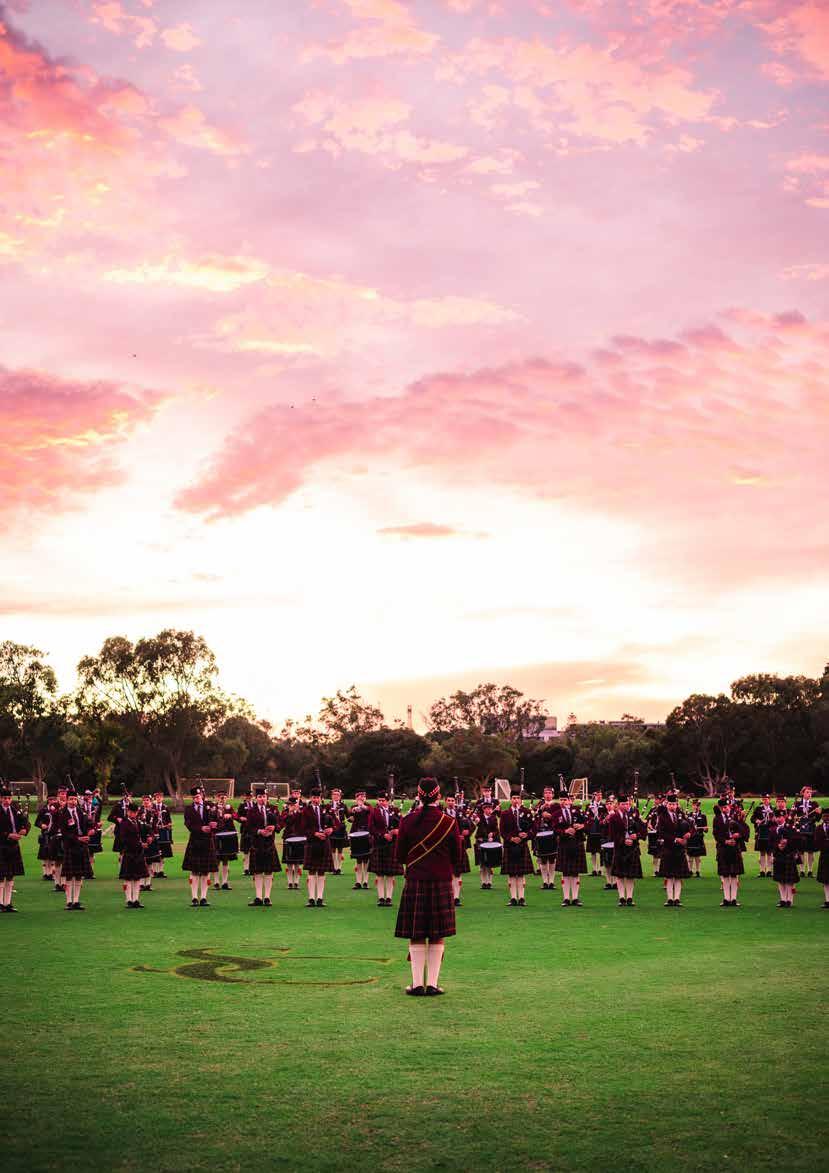

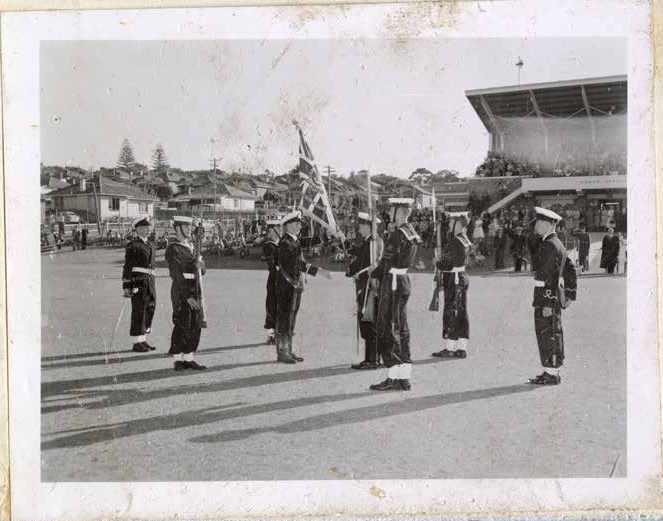
Join us on 21 February 2025 to celebrate the centenary of the Memorial Ground
100 years ago, this coming February, the first teams ran on to the Memorial Ground, a memorial to the brave Old Scotch Collegians who had joined the ranks during World War One. According to the 1925 Reporter due to the ‘Firsts’ preferring the wicket on the Oval (the space where the Chapel and other buildings now sit) the honour went to the ‘Seconds’, who had a low scoring victory over Perth High School.
Fundraising for the Memo first began in 1916 and the fact the school owned 18 acres of land at Butler Swamp for its cow herd meant that most funds could be used to cultivate and prepare a suitable playing surface. Flooding from Butler’s Swamp, as it was known, was a significant early issue and ideas to counter this included draining the Swamp into the river or ocean, as the state government had done with Herdsman Lake. Neither of these options were forthcoming even as a part of any Depression era relief projects. In the end, there were significant man-hours put in by the boys, with a record eighty-six attending one Saturday morning, and the Ground was ready for play in February 1925.
By the time Maxwell Keys arrived in 1947, the flooding had become such an issue that it had to be addressed and agricultural style drains were built and the water then pumped away. These complemented the levy which protected the grounds except for in peak rainfall periods. Following an event whereby a trench in the levy was cut to flood the grounds, much of the eastern side of the playing fields was lifted to limit the impact of flood waters. As we all know, the ‘Memo’ is still susceptible to flooding but it is also as good a surface and cricket wicket as anywhere and it is time to celebrate its centenary in style.
If you’ve got memories of the Memorial Ground, we’d love to hear from you, and we also ask that you put 21 February 2025 in your diary for an event to celebrate the centenary. While this event is unlikely to have 1500 OSC attending, as we did for the 1997 Centenary Dinner, we do hope for an event to bring our community together and celebrate what has been a wonderful part of the College’s history.
Please email mail@scotch.wa.edu.au with memories of the ‘Memo’ and register your interest for the event at the QR code below.
When war was o’er, in love was found
Sufficient for a ‘Memo’ Ground –Reminder ever on to be Of Scotchies’ fight for liberty.
G. G. ‘Bull’ Campbell OSC1905 and staff member until he died in 1952.


Register your interest to attend the event on 21 February, 2025
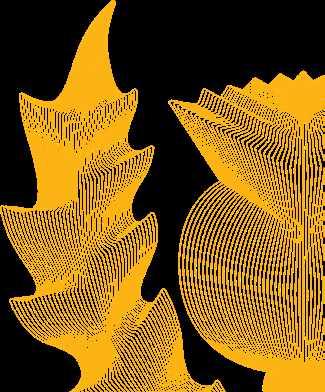

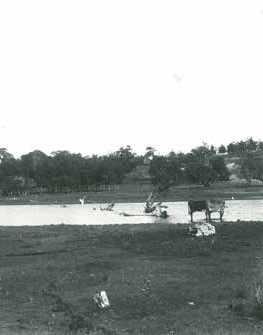
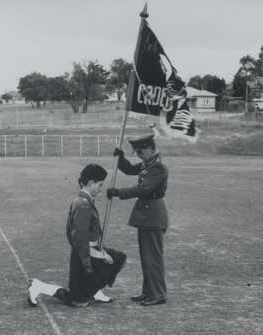
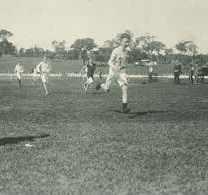
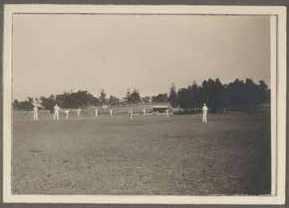
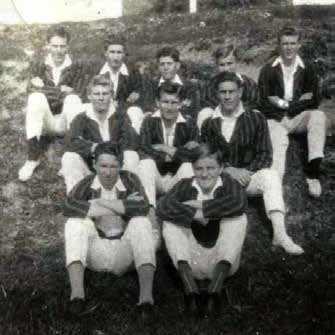
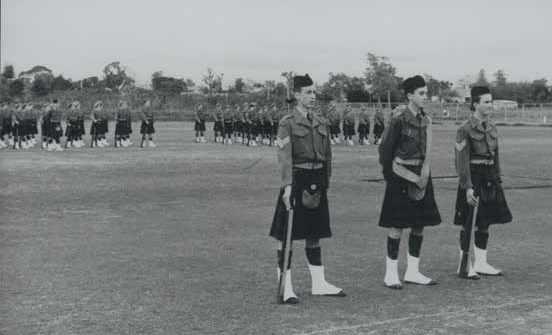

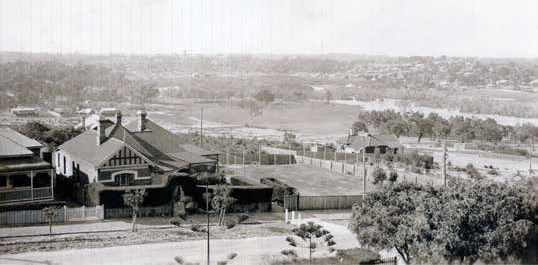
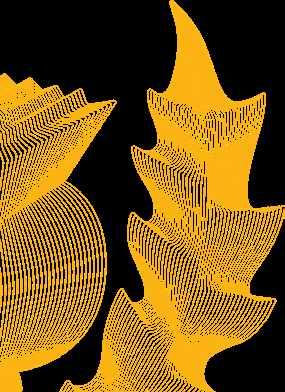
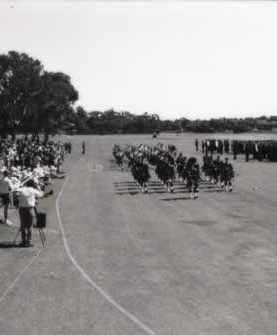



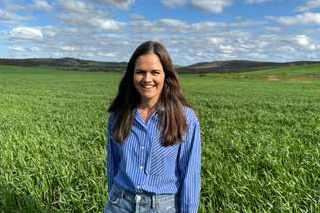
Sophie Kelly, has recently joined the College in the role of Admissions Officer | Science Teacher. We took a few minutes out of her busy schedule to find out more about her.
Sophie, can you tell us a bit about yourself?
I grew up on our family farm south of Moora with my two siblings. My childhood was filled with the simple joys of rural life; playing outdoors, helping out with numerous farming happenings and being a part of the local community, particularly sport, depending on the season. I value this upbringing.
In Year 8, I moved to Perth for boarding school, which was naturally a daunting experience moving to a boarding house and a school, nearly as big as my home community, with no one familiar to me. Grateful for the love of sport, this kept me busy as I settled into the new norm!
Post school I worked on some outdoor education experiences which led me to change university courses to pursue physical and outdoor education.
When did you decide you wanted to become a teacher?
I found my passion of teaching and helping others through coaching surfing and swimming in various locations. After studying, I taught physical education.
I now work in the Admissions Team which I am enjoying as I love to build connections with prospective families. As I was boarder myself, I enjoy working with boarding students and families as they navigate such a crucial time in their child’s life.
On top of your admissions role, you are also teaching Year 8 Science. This must keep you busy!
This is a unique combination and one that I am thoroughly enjoying as I balance both roles. Being a familiar face in the Middle School is rewarding. It is wonderful to be ‘on the ground’ to get to know the students and the day-to-day running of the school from curriculum to co-curricular opportunities.
I am loving the connection to the student experience and being able to share a well-rounded perspective for prospective families as they explore their schooling choices for their sons.
What do you do in your spare time?
I still have the connection back to the country and I continue to commute to play hockey for Dandaragan. I enjoy giving back to and connecting with the community in numerous ways.

James Jesson recently joined the College as Head of Shearer House. Let’s get to know him.
Welcome to the College James! Can you tell us a little about your journey to now.
I started my teaching career in rural Victoria as an English Teacher. While there, I gained experience in public, private and catholic school settings and found the love of my life. My wife and I moved to Perth in late 2021, surviving the compulsory 14-day hotel quarantine. Living and teaching in the longest COVID-19 lockdown in the world certainly taught me a lot about myself and the nature of educating young people.
You are joining the College and going straight into a Head of House role. How are you finding it?
I’ve really enjoyed taking on the role of House Head, Shearer in the Senior School. In particular, the warm welcome and support I’ve received from staff, students and parents has been something that I am very grateful for and has made my transition smooth. My previous pastoral care leadership experience has prepared me well for stepping into the role and the nature of the vertical House system in the Senior School has fostered a great deal of motivation and purpose in my role.
What have you enjoyed the most so far and what are you looking forward to?
I have really enjoyed being part of the Shearer House community at Scotch College. The connections and standards we have set as a group is something I’ve enjoyed and am very proud of. Travelling to Melbourne on the Hockey Tour has certainly been a highlight of my first year the College.
Any hobbies or passions?
I very much enjoy playing and coaching hockey. Going for a run or getting out to the ocean are certainly a fixture of my weekends and holidays. When I get time, I enjoy reading fiction and writing it, too.
What would surprise students about you?
I have a really, really large collection of patterned socks, and as you can see from the photo, my greyhound, Agnes, has a greater sense of style than I do!
What inspires you?
My lovely wife, Emilie, is certainly an inspiration for me. She keeps me grounded and has so many qualities that I look to develop in order to better myself.
Nic Munro (OSC 10) was recently appointed Director of the new Scotch College Clontarf Academy. We find out a bit more about the role of the Academy at Scotch and Nic’s goals and challenges for this new initiative.
Welcome back to Scotch Nic. Can you tell us a little about yourself and how you became involved with Clontarf and the Academy at Scotch?
I have lived in WA all my life, attended Rosalie Primary and then Scotch College during High School. I studied graphic design and sport development before working alongside the WA Football Commission with the Women’s WA State Team.
It was from family discussions that I developed an interest in Clontarf, and its model of making a difference to the lives of young Aboriginal and Torres Strait Islander men. In 2019 I applied for and was successful for a role at Clontarf in Esperance, then ventured to the Kimberley as part of the Halls Creek Clontarf Academy, and most recently three years back at Esperance.
I was given an opportunity to move to Perth to be the Director of the new Scotch College Clontarf Academy.
What will Clontarf do on the ground at Scotch? How will the Academy work?
The Clontarf Foundation aims to equip young Aboriginal and Torres Strait Islander men to more meaningfully participate in our society. At each Academy, we work to improve their education, discipline, life skills, self-esteem and employment prospects.
The Scotch College environment provides excellent structure to guide an academic education programme. Importantly, it has the flexibility to enable Clontarf to engage the boys in a diverse range of in-school and extra-curricular Academy activities, within the focus areas of education, leadership and life skills, employment, healthy lifestyles, and sport. The passion that the boys have for sport is particularly important.
Some of our Academy activities include leadership camps, inter-academy carnivals, employment forums and workplace visits. How many boys are you expecting to join the Academy?
Scotch College currently has 20 Aboriginal and Torres Strait Islander students attending and, with the Academy partnership now getting into full swing, I am expecting an increase in future numbers.
Any Aboriginal and Torres Strait Islander boy enrolled at Scotch College can apply to be
part of our programme. Once accepted, and to maintain their position in the Academy, that comes with a commitment – regular school attendance, focusing on their education and ‘putting back into’ Scotch and Clontarf.
What is the Academy’s and your ultimate goal?
The main goal for Clontarf is to assist their students on their school journey – to be better young men and better students, right up to the completion of Year 12. Upon graduation, Clontarf supports students as they transition from school to further education and training or employment.
I have seen amazing things happen with Academy boys over the years. For me, it’s about ensuring a safe and interactive space where thoughts and ideas can be shared, as well as helping provide structure around what are often hectic and demanding lives.
“For me, it’s about ensuring a safe and interactive space where thoughts and ideas can be shared, as well as helping provide structure around what are often hectic and demanding lives.”
with Clontarf, so that alone is a challenge. Ensuring integration of College and Clontarf is essential. I have many experienced and enthusiastic Scotch and Clontarf colleagues assisting me as we are getting started and I know this will continue.
Also, I am an Old Scotch Collegian. Knowing the system of a PSA School is going to be very helpful, particularly as new Clontarf students enter new surroundings, especially those from schools and localities which have not previously had this exposure.

What excites you about the Academy and this role?
As a past Scotch student, I am extremely proud to see the College leading from the front in its Clontarf partnership.
I’ve been able to meet the boys and seen the excitement on their faces about having access to a Clontarf Academy and the related opportunities. I’m really looking forward to the individual interactions, the characters, and seeing the difference our programme will make.
What challenges do you foresee? Like any new initiative, I’m sure there will be teething matters to sort through. Scotch will be the first PSA School in WA to partner
What do you hope to achieve in your first year at the College?
The remainder of this year is about building relationships with the boys already at school and providing some early sense of what Clontarf can offer. Creating an Academy Room for them to have as their own space at the school will be a priority, as will allow some different in- school and extracurricular activities.
My personal aim is to continue to positively make a difference to the lives of Clontarf boys, particularly through being a mentor and role model.

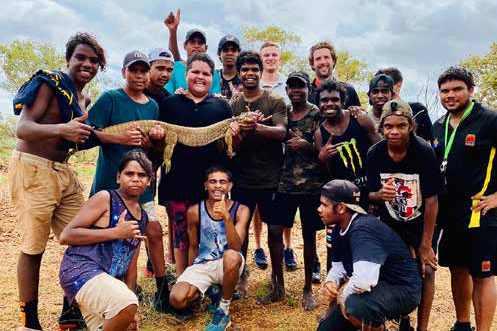

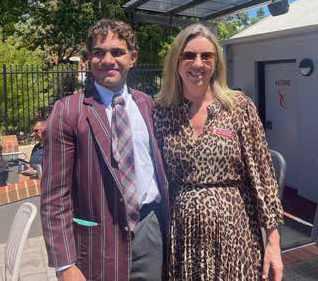
Senior Admissions Officer, Catriona Nixon talks to us about her experience with Clontarf and Indigenous Scholarships
During my years as Deputy Principal at Carnarvon Community College, I had the privilege of working closely with Clontarf Academy, so I was delighted when they announced their partnership with Scotch College.
Given my experience with Scotch College, having had a son attend boarding school here, I was well-positioned to assist Aboriginal families applying for scholarships. Aboriginal students and families often have a lot of questions around a Perth education and moving to a boarding school environment. It was great to help answer these questions, while providing support reference letters and assisting families with navigating the scholarship process.
One memorable highlight was seeing Thomas Dann at the March Out in 2023. Having taught him in Carnarvon and then recommending him for a MADALAH scholarship, it was a poignant moment to witness his completion of his schooling journey. His family was deeply moved to see us together, and Tom and I had many meaningful conversations over the years, whether at PSA games or around campus. He was incredibly proud of his accomplishments and had clear goals for his future.
At Scotch College, we are now in the final stages of the MADALAH/Indigenous Scholarship process for the 2025 academic year. Many of the families applying are aware of our partnership with Clontarf, and they are excited and reassured to have a familiar support structure in place, as most applicants come from schools with a Clontarf academy.
With 27 years of experience in education in the regions, I firmly believe that the partnership between Scotch College, Clontarf, and MADALAH will provide Aboriginal young men with the education and support they need to succeed.
We spoke to parents and guardians of some of our Indigenous students to find out what the value about Scotch and their views on the new Clontarf Academy
Why did you choose Scotch for Lynton? When considering schools for Lynton we were really impressed with the people we met during the process. We were met with friendly and welcoming staff such as Jordan Owenell who were honest and open about their promotion of the school and answering any questions we had regarding Scotch. Once we had made our decision, we were really impressed with the Boarding Orientation program at Scotch. Weekly Teams meetings with school and boarding staff and other future students meant that Lynton felt confident to start at Scotch.
What schooling opportunities are you hoping for Cooper and Nate as they arrive to commence their boarding journey in the next few years?
We are looking forward to Cooper and Nate experiencing boarding life and city life. Living in Karratha we are limited to some extent with some education and sporting opportunities therefore we are hoping that Scotch will be able to offer many different pathways available to the boys.
What do you think about the collaboration with Clontarf?
Clontarf is well established in Karratha, so we are lucky enough to have experience with the Clontarf program already. We are really excited to see that Clontarf is starting at Scotch as it will provide culturally appropriate support and advice for the Aboriginal and Torres Strait students. For our family, Clontarf will be a familiar program for Lynton and our sons Cooper and Nate to engage with whilst they are at Scotch.
What would you like to see in the future of the school?
We are excited to see how programs such as MADALAH and Clontarf continue to be integrated into Scotch to increase opportunities for more Aboriginal and Torres Strait Islander kids to attend this amazing school.
Sarah Ugle (Aunt)
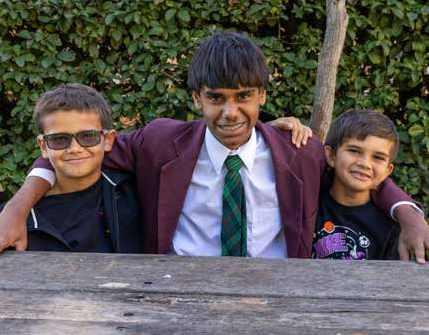


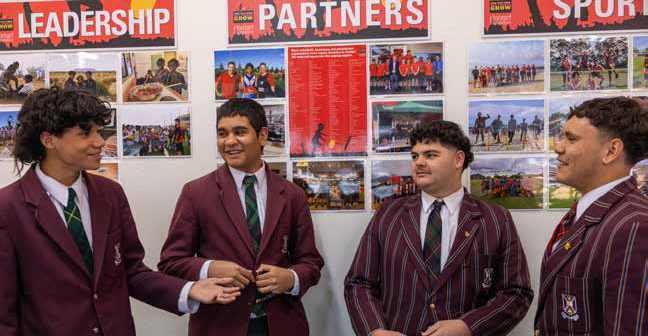
Why did you choose Scotch for Mesheech?
We gave Mesheech the choice of school he would like to attend, and he chose Scotch. There are several Indigenous Derby boys who have attended Scotch and he wanted to be a part of that elite group. Also having his cousin Nicki Chi who he completed most of his Primary School with helped with his decision.
What schooling opportunities are you hoping for Mesheech in his remaining time at Scotch and beyond?
I hope for him to leave Scotch not only as a graduate but an independent man who would walk straight into a job that he would like to try or already is passionate about. Whether that be a job in Perth or back home in Derby with the Shire of Derby, West Kimberley in the role he has now. Also, to gain experience in playing for a championship/premiership team at Scotch.
What do you think about the collaboration with Clontarf?
I believe the collaboration with Clontarf is going to be great. I used to be employed with Clontarf, I love their motto and believe it is a partnership programme most schools with high Indigenous students should have. Their partnerships, links and community involvement across Australia is absolutely deadly, the way they work with Indigenous boys is great.
Anything you would like to comment on Mesheech’s journey so far?
I believe the journey he’s on is great. It has developed him into an independent young man and definitely a leader. He has led his Junior Basketball team back in Derby during the last Senior Basketball Carnival really well. He also gets to his work by himself or sorts a way to get there. He is able to coordinate really well things that are needed for him to succeed.
Trevor Ozzies (Father)
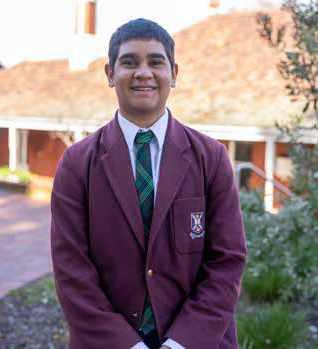

“Their partnerships, links and community involvement across Australia is absolutely deadly, the way they work with Indigenous boys is great.”

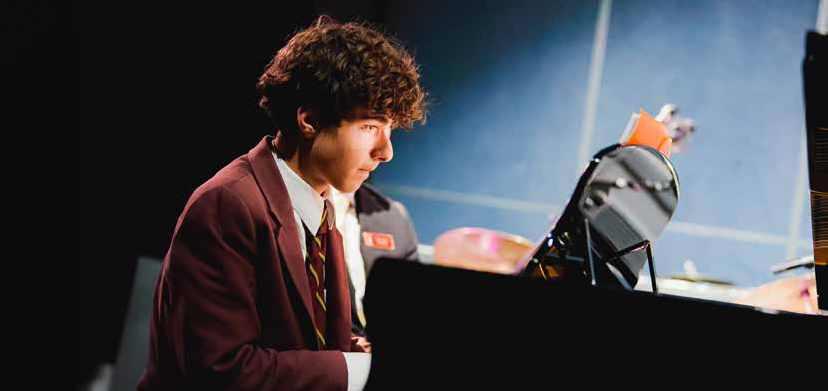
Music brings us together as a school community, fostering a sense of belonging, pride, and joy.
Scott Loveday Head of Performing Arts
For many students at Scotch, music is more than just a hobby or a pastime. It is a powerful tool for learning, creativity, and wellbeing.
Studies have shown that music education can enhance academic performance, cognitive skills, social-emotional development, and cultural awareness, but engagement in learning and playing a musical instrument can also help students cope with stress, express themselves, and connect with others.
Music is not only a part of our curriculum, but also a part of our culture and identity. Music brings us together as a school community, fostering a sense of belonging, pride, and joy. Often, musical performance is not the focus of a particular event, but it forms a critical part of the success of the event by underpinning the tone, guiding the mood, highlighting key moments, fulfilling a ceremonial role, and creating lasting impressions or memories associated with the event. We just need to consider our weekly assemblies, whether it’s in the Senior, Middle or Junior Schools; or our chapel services each day; or our fortnightly Saturday evening Kirk @ Scotch services. Or perhaps some of the other significant occasions in our calendar such as ANZAC day, or March Out, or Valedictory, maybe even some of our parent social functions.
Whilst we celebrate our musical achievements and talents through concerts, festivals, competitions, and showcases, we need to remember the importance of the role of music in our everyday school lives and activities and benefit for every person in this. It’s in these spaces that the sense of purpose for the music community is firmly established.
Recently, our Head of Performing Arts caught up with some of our next generation musicians to give our Clan readers an insight into their musical journeys.
Heath Arbuckle
Music fellowship holder
Year group & age: Year 11, 16 years old Instruments played: violin, flute Ensemble involvement: Scotch Concert Band, Chamber Strings, Vocal Collective, Senior Flute Ensemble, Kirk @ Scotch consort Representations: West Australian Youth Orchestra (Philharmonic Orchestra).
I started playing the piano when I was five years old, then I started violin as part of the Year 3 string fellowship pathway at Scotch. One of the best teachers I’ve ever had was Mrs Sarina Davies (nee Li), whose nurturing and caring inspired me. I also started learning the flute in Year 6 as part of the Year 6 band pathway and I’m still playing both.
My most memorable moment to date was a concert performance with the PLC-Scotch Symphony Orchestra, conducted and directed by Dr Daniel Masmanian. I was a very young musician and found it fascinating that after we played the first chord of the piece (the Overture from Die Zauberflute), he stopped the orchestra and directed us to re-start!
I always want to keep music as a central part of my life, even after leaving school. It’s a great creative outlet and I have always enjoyed it. I hear a lot of people say they regret stopping their musical journey and I don’t want to be in that position. I am auditioning for the West Australian Youth Orchestra and hope to achieve a placement in the Symphony Orchestra for 2025.
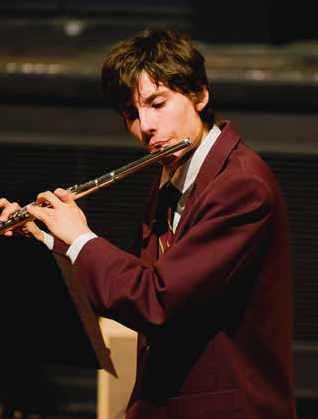
Seth Loveday
Music
scholarship holder
Year group & age: Year 10, 15 years old
Instruments played: piano, percussion
Ensemble involvement: Scotch Concert Band, Scotch Jazz Orchestra, The Piano Gang, Highland Thunder Drumline
I started my musical journey in pre-primary at my previous school, Carey Baptist College. I began on piano with Mrs Deborah McGuiness and did my early AMEB grades during this time. In year six I began percussion as part of the year six band pathway. Even though piano is technically a percussion instrument, now I get to play all sorts of different instruments every week, which keeps things interesting.
One of my most memorable musical experiences was only recently, when I was selected to play Keyboard Two as part of the professional band in the Scotch-PLC production of School of Rock, The Musical It was an extremely fulfilling educational experience playing with professional musicians and collaborating with other passionate arts students involved in the show. The social aspect was fun too.
In the short term, I’m taking the IB Diploma HL music course and want to continue performing with the various ensembles I’m part of. I’m hoping to be selected for the Australian Combined Schools Music Festival in Adelaide during June 2025 and will continue with collaborative opportunities, such as accompanying younger soloists for performances.
Lucas Huang
Music scholarship holder
Year group & age: Year 7, 12 years old
Instruments played: violin
Ensemble involvement: Chamber Strings
I started my musical journey the day after my 5th birthday when I had my first lesson on violin, with Mr Chee Yong. I have been his student ever since. I have a great relationship with him and he is quite inspiring as a teacher.
My most memorable musical moment to date is probably my first Eisteddfod, when I was six years old. I had only been learning violin for a year, and I was awarded first place for my performance of Theme from Witches’ Dance (Paganini). I was so happy because the other people in my section of the Eisteddfod were all older than me and I thought I didn’t have a chance.
I am currently working toward my 8th grade AMEB violin examination. I certainly want to complete my AMus and potentially my LMus one day. In the short term, I am auditioning for the West Australian Youth Orchestra and am hoping to be successful in obtaining a place in the Symphony Orchestra for 2025.
Leo Hao
Music student
Year group & age: Year 5, 9 years old Instruments played: Piano, Cello, Voice (singing)
Ensemble involvement: Youth Strings, Youth Voices
Representations:
I started my musical journey when I was 5 years old. I started playing cello, then a year later I started learning piano. Last year, I started formal singing lessons with Robert Hoffmann.
My most memorable musical moment was only very recently. I was selected to perform a vocal solo at the Scotch Winter Soirée. I think it really helped me to prepare for the Western Suburbs Music Eisteddfod, which I’m performing at in September.
I’m only in Year 5 at the moment, so I plan to keep going with all of my instruments next year in Middle School. One day, I hope to play for big concerts, maybe with an orchestra like the West Australian Symphony Orchestra.
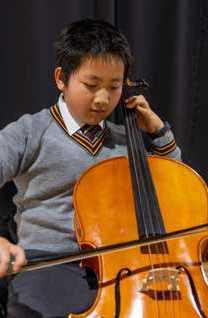
Studies have shown that music education can enhance academic performance, cognitive skills, social-emotional development, and cultural awareness, but engagement in learning and playing a musical instrument can also help students cope with stress, express themselves, and connect with others.
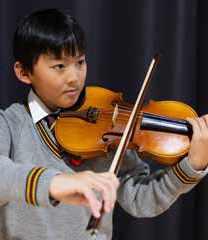
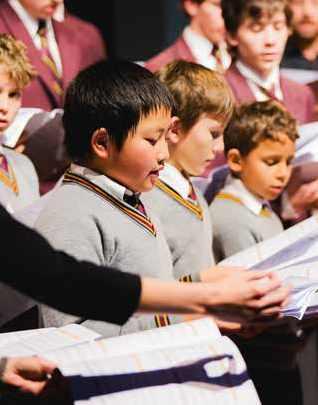
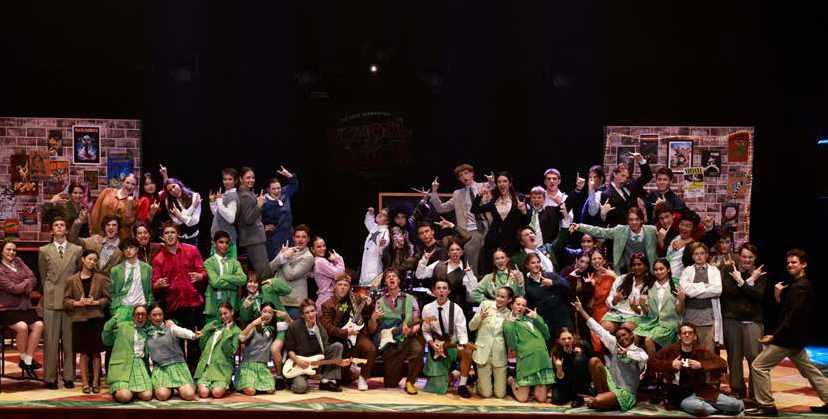
Sarah Combes
Curriculum Leader -
The Arts
It is the supreme art of the teacher to awaken joy in creative expression and knowledge. Albert Einstein.
The transformative power of rock was channelled by the Year 9-12 senior school cast performing in the 2024 PLC/Scotch production of School of Rock, The Musical With a large double cast and several students performing live instruments on stage (in addition to singing, acting, and dancing) this was quite possibly our most ambitious performing arts project in recent years.
School of Rock, The Musical tells the story of Dewey Finn, a down-on-his-luck rock musician who pretends to be a substitute teacher and discovers the musical talents of his class. Driven by his passion for rock and roll, Dewey hatches a plan to turn his students into a guitar shredding rock band. He teaches the class that there is more life than gold stars and achieving straight As, inspiring them to embrace the rebellion of rock music, break free from societal expectations and find their own unique voice.
The story of School of Rock, The Musical is loosely based on the Langley Schools Music Project, a children’s choir assembled by struggling musician Hans Fenger, performing covers of songs by Paul McCartney, David
Bowie, the Beach Boys. Like Dewey Finn, from the moment he entered the classroom, Fenger’s students knew he wasn’t like the other teachers. His approach to music instruction was considered radical at the time in that it emphasised participation over theory and having students learn to play pop songs which spoke to them.
“From the very beginning of my teaching career, I had always really thought that my job was to have children fall in love with making music.” Hans Fenger.
Arts Education isn’t solely about producing the next generation of artists, actors, film makers, and musicians, but teaching students how to make the connection between creativity and real-world application. Our goal is not only to impart knowledge, but to nurture a love of the arts by inspiring students to develop their own creative voices, realise their full potential and discover lifelong enjoyment that comes from artistic expression. Just ask any cast member from this year’s production – staging the School of Rock, The Musical was an unforgettable and transformative experience that will remain in the hearts of students for a long time to come.
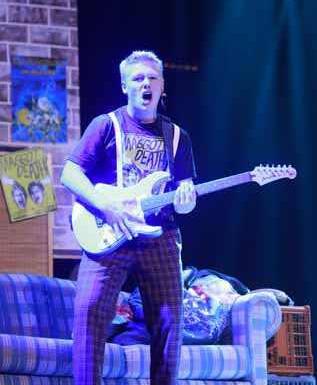
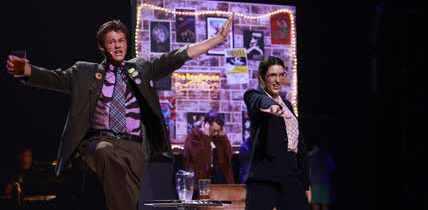
Mr Aaron McDonald
match between the two alumni organisations, played at half time during the First XVIII match between the two schools. Jeremy Walden (OSC 1991) played bagpipes to ease the OSC team’s nerves whilst playing on the opposition ground.

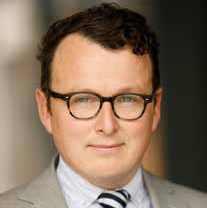
On 24 June 1904, the Old Boys’ Association (which we now know as the Old Scotch Collegians) hosted its inaugural meeting. It was obviously a different era, Google tells me women’s suffrage had only been granted a couple of months earlier. Mr John Sharpe was appointed the Association’s first President.
This means that the OSC has therefore recently celebrated its 120th birthday. It is an incredible innings for a wonderful association that does so much for its members both during and after leaving the College. I wonder if the founders of the Association foresaw such comprehensive levels of involvement between the College, the Association and its members all these years on.
AFL 9s Victory
Coming back to the 21st Century, the OSC recently faced up against the Christ Church Old Boys Association in the annual AFL 9s
Thanks to the sterling efforts of former West Coast premiership player Mark Seaby (OSC 2001) for putting on his boots ably assisted by Best on Ground and Subiaco premiership player Ben Randall (OSC 2001), the OSC snuck home with a 1-point win. Yours truly (0 possessions) also played a pivotal role in defence. Reports suggest Christ Church is apparently in training for next year already to take back bragging rights.
The PC Anderson Scholarship is a scholarship awarded to students of the College going into year 12 and is the scholarship bequeathed by the OSC.
I held interviews together with the Acting Headmaster Brad Gill. The quality of the candidates, as you might expect, was sublime. After some difficult deliberation, I am pleased to announce that the PC Anderson Scholarship winners are Bruno Erickson (nephew of Stephen Kelsall OSC 1978) and James Wall (son of Peter Wall OSC 1993).
By the time you read this edition of Clan, the OSC will have hosted (together with the Parents’ Association) its next Business Directory event focusing on the health sector. These events are championed by myself and Richard Gardner (OSC 2000). The event features Sunnny Narula (current parent), Katie Stewart (current parent), Liz MacLeod (past parent) and Matt Atkins (current parent and OSC 1995). We hope to host more of these events throughout this forthcoming financial year to add value to our members of the OSC. Please reach out OSCPresident@scotch. wa.edu.au if I can assist with anything.
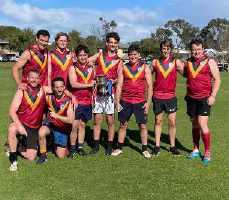

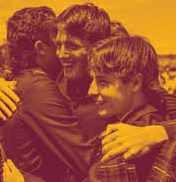

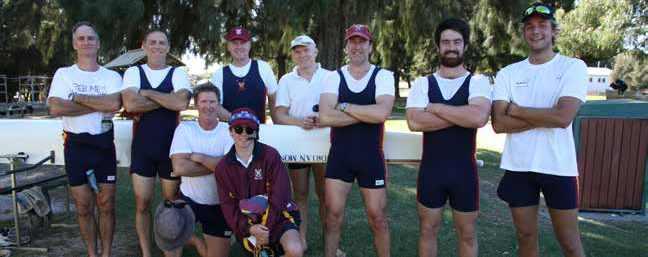
In 2014, a small group of Scotch dads, who had all rowed for the school decades before, met one morning after dropping their sons off at the boatshed.
One dad was going for a swim, another for a kayak paddle, another for bike ride and another to the gym. Before long, they’d decided it was time they got back into a rowing shell.
This was the beginnings of the Old Scotch Collegians Boat Club. After several outings, it wasn’t long before competition came calling, and in 2016 the group was invited to compete in their first Rowing WA sanctioned race against established clubs such as the WA Rowing Club, UWA Boat Club, ANA, and Curtin University.
Unofficially known as Goland Oars, the group’s increasing presence at Rowing WA regattas brought the requirement to register as an inaugurated club and soon, the Old Scotch Collegians Boat Club was no longer making guest appearances only.
Now in its tenth year, the OSCBC has represented Scotch at numerous races at the State and National Masters levels and across distances ranging from the 300m sprints at Elizabeth Quay and 1000m events at Champion Lakes, to the 6.5km Guildford to Garratt Road head race and the gruelling 16.5km race from Perth to Fremantle.
OSCBC has enjoyed multiple wins at all these events, among the most notable of these being the 2019 Perth-Fremantle race where we beat interstate crews competing as part of the National Masters Championships.
Club stalwarts John Flecker (OSC 1984) and Julian Mathias (OSC 1985) won the 2023 State Masters Championship in a pair, while in the same year, Mathias and Alex Hatch (OSC 1985) became the first rowers

ever to complete the Perth-Fremantle race in a coastal double scull (a hybrid craft for rougher waters).
Wins on the board are great, but the OSCBC is about more than just that. From the very beginning, OSCBC has been about welcoming Old Boys back to the school and to a sport which can form the strongest bonds from a young age.
Some of us had rowing success on the state and national stages, and some of us hadn’t rowed since our school days when we joined OSCBC. Rowing backgrounds don’t matter – fitness, fun and some competition if you’re up for it are the primary drivers for this group with ages ranging from recent leavers to veterans.
OSCBC regularly demonstrates this to the school community at the annual House Regatta, held in October, where Old Boys race in eights against the current First VIII. It’s at the House Regatta where Scotch rowing can truly stretch across generations, with some OSC fathers racing their sons. Recent years have seen the young Old Boy crew (aged 18-30) win the 700m sprint, followed by the OSCBC masters in second and the current First VIII in third place.
The veterans, aged 65 and over, are typically given a head start in this race, but they are competitive against their peers. OSCBC vets raced at the 8km Head of the Yarra in Melbourne in 2023, finishing third in their division.
The House Regatta is important also because it is when year 12 rowers receive their Goland Club ties, a symbol of their time rowing at Scotch and of the everlasting connection they have with the school and its rich rowing history.
Ten years on, the OSCBC remains the only registered Old Boy rowing club in Western Australia, and has the highest percentage of competing rowers of any WA club.
Alex Forrest (OSC 1989)
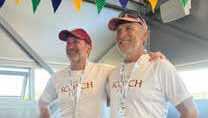
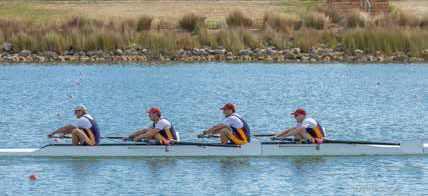
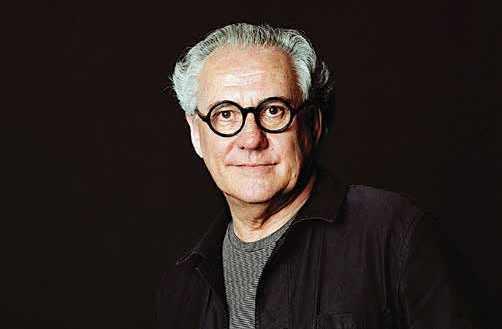
Born: Geraldton, 1949 Died: Perth, aged 74
Edgar William Snell was born in Geraldton on March 25, 1949, youngest son of Annabella (nee Ronan) and Edgar Snell (OSC 1922), always known as Bill. His mother preferred to be known as Anne. This third son preferred to go through life as Ted. The family lived in Geraldton until 1952, when they moved to the Perth suburb of Dalkeith.
Ted attended the local primary school for seven years and completed secondary schooling at Scotch College. The arts generally were his milieu. A keen member of the school’s dramatic society, he appeared in its production of Shakespeare’s A Midsummer Night’s Dream
Ted had plenty of artistic encouragement at home. Noting his enjoyment of drawing and related creativity, his father made him an artist’s wooden easel. Anne took him to galleries, including the Skinner exhibition space in Malcolm Street, Perth.
Ted was a Bob Dylan fan in the 60s and saw him perform in Perth in 1966. Ted later took on his father’s love of classical music and opera.
John Thyne 1946
Peter Jeffrey 1949
Francis (Frank) Owen 1950
Bruce Smedley 1955
Robert Birch 1956
Irwin Clements 1956
Ian (Bruce) Baxter 1957
Arthur Mercer 1958
John (Jack) Hudson 1959
Philip (Phil) Gray 1963
After school, Ted studied art education and taught at Christ Church Grammar School. He did postgraduate studies in Birmingham, England, in 1972. Returning to WA, he held senior positions at the WA Institute of Technology (later Curtin University) for 33 years. Chairing the Sydney-based Australia Council’s visual arts board heightened his national presence.
In 1975, he met Mary Moore, then an aspiring artist. His mentoring, she says, inspired and guided her career. They married in 1982.
Pier Leach, a journalist specialising in arts coverage, worked with Ted at UWA for 12 years, from 2009 until his retirement in 2021.
“Ted aspired to build on Perth’s cultural capital,” she recalls. “He had visions of projecting art and artists well beyond the confinement of galleries. His eye for talent was extremely keen. During UWA’s centenary in 2013, for example, he was delighted to see the campus go on public parade. The LUMINOUS night show, centred on illuminating Winthrop Hall, was one example.”
He never lost his curiosity, she adds. The phrases “big picture vision” and “thinking outside the box” could have been invented for Professor Snell. Member of the Order of Australia was among his formal honours, awarded in 2008.
Jim Cairns 1963
Peter Avery 1965
Barry Walters 1967
David Plaisted 1973
Nicholas Forster 1978
Ben Walawski 1998
Todd Retallack 2016
Professor David Tunley Council Member from 1975 - 1986
A brain cancer diagnosis was a severe blow, but he remained cheerful, his eyes lighting up upon accepting what would be his final accolade, the UWA Convocation Medal.
The convocation is the body of graduates.
He died on September 25, 2023, survived by Mary, their daughter, Bella, and sons Jake and Will, four grandchildren, and by Ted’s brothers, John (OSC 1954) and Mike (OSC 1965).
Perth Institute of Contemporary Arts eulogised Ted “as a leader, curator, writer, educator and artist — tireless in ambition for the arts in WA and beyond”.
His studio at home in Fremantle is full of his own paintings.
He could also make an art of saying farewell. In 2020 his obituary for Ross Seaton, who died in May that year, noted that Ross was always preoccupied on a “journey of discovery”.
Just like Ted, who revealed so much to so many with such enduring grace.
Written by Patrick Cornish (OSC 1965) and published in The West Australian on Wednesday, June 26, 2024.
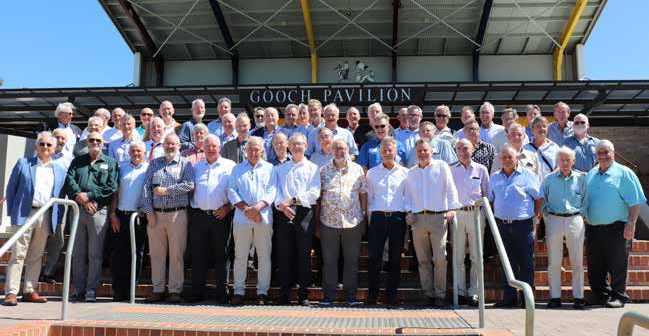
1. Class of 1974
The 50-Year Reunion for the Class of 1974 was celebrated on March 22 with a relaxed lunchtime cocktail party at the Gooch Pavilion. Throughout the years, our OSC’s hold dear the opportunity to come together with old friends and reminisce about days gone by. We extend our heartfelt gratitude to all who attended the event, with special
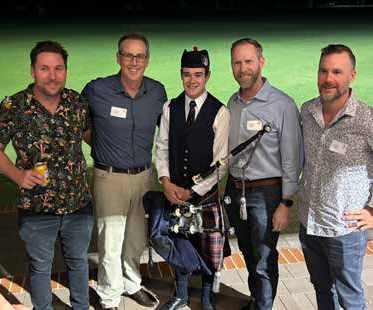
thanks going to Peter van Hattem, Alan Dench, John Hearne, and Trenton Harris for their remarkable effort in organising the reunion.
Special recognition goes to Trenton Harris and Chris Greenwood for delivering an exceptional speech about the Class of 1974, it was certainly one to remember!
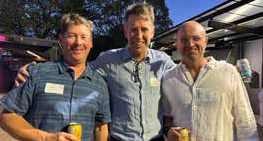

What a night to remember! The Class of 1994 marked their 30-Year Reunion at the Gooch Pavilion on April 19. It was an awesome evening, packed with laughter and fond memories.
Thank you to everyone who attended, with special gratitude to those who travelled from afar to help make this reunion truly memorable.
Special thanks to Duncan Bond for working with the Alumni Office to pull together this fantastic reunion for the cohort.
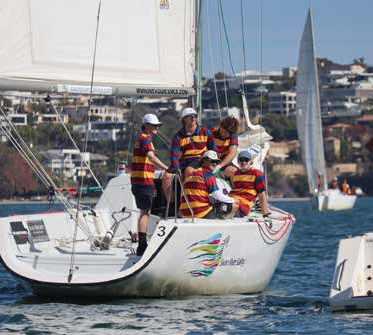
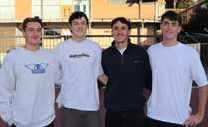
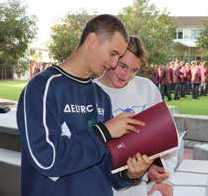
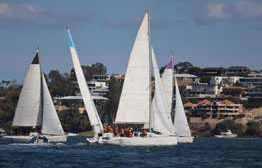

With close to 20 sailors, it was another solid turnout for Scotch at the annual College Cup on April 28. Being the only school to field two teams on the Foundation 36s, with extra sailors on the Scotch support vessel provided by Marcello (2019) and Raff Torre (2021). Both teams sailed well, however this year’s competition was too tough in the arguably perfect sailing conditions, with Scotch coming in 4th and 5th place.
The fun did not stop on the racecourse, as the perfect weather conditions continued to be enjoyed on the picturesque Freshy clubhouse lawn.
Huge appreciation to George Boulden (2015) and Peter Barblett (1979), who facilitated and organised the day for all the sailors. Additionally, a special thank you is in order for Nim Bhharathhan (2017), who took the position of Chief Photographer.
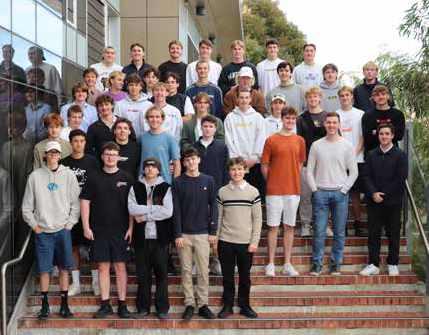
Thanks to members of the Class of 2023 who attended the annual Reporter Collection Breakfast. It was wonderful to reconnect with so many of you at your first official OSC event since leaving the College.
We enjoyed hearing about your adventures this year – travels, studies, and careers. We eagerly anticipate seeing you again soon.
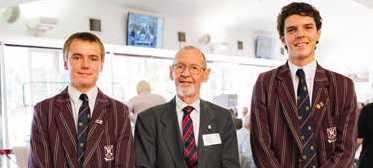
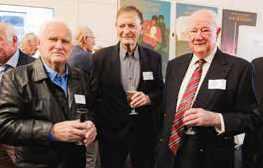
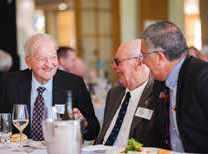
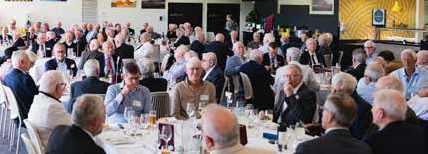
Old Scotch Collegians came together to enjoy our annual Seniors’ Luncheon on Friday, May 24. The well-attended luncheon is a testament to the enduring bonds formed during school years at the College decades earlier.
The highlight of the gathering included the traditional ‘Countdown’, led by Glenn Longmire (OSC 1967) the musical
performances by James in Year 11, and the “Youth Voices” choir, comprised of talented year five and six students.
As we reflect on this memorable day, we are reminded of the enduring spirit of Scotch College and the lifelong connections it fosters.
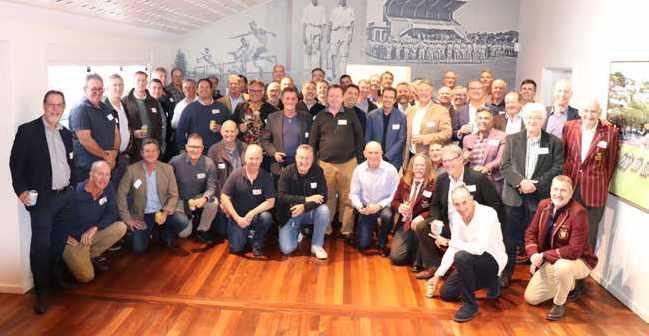
The Class of 1984 marked their 40-Year Reunion on June 21 with a Sundowner at the Gooch Pavilion. Amidst the gathering, old friends savoured the chance to reconnect, swap stories, and reminisce about days gone by.
Special thanks to the former teachers who made the effort to be there – Mr Ian Saggers (OSC 1950), Mr Neville Punch, Mr Ian Lindsay
and Greg Bunney (OSC 1970). We also extend appreciation to John Flecker and his reunion committee for their exceptional efforts in reconnecting the cohort, and to Bruce Dukes from Domaine Naturaliste Wines for sharing some if his finest vintages so generously with his former classmates! Together, you all made it an extremely enjoyable evening.
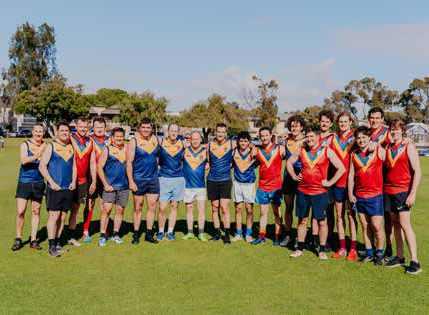
With good playing conditions at the CCGS Mount Claremont playing fields on Saturday 22 June, Old Scotch Collegians faced off against our cross-highway rivals, the Old Boys Association of Christ Church Grammar School, in an AFL 9s charity match in support of Beyond Blue.
The competition was intense, culminating in the Old Scotch Collegians emerging victorious this year. Despite the average quality football on display, the Old Boys enjoyed themselves immensely, and thankfully, there were no
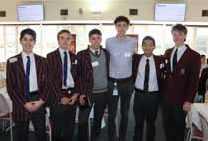
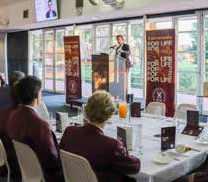
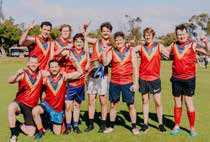
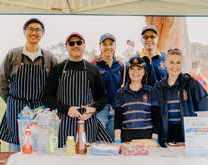
significant injuries reported! $925 was raised from the sausage sizzle for Beyond Blue, an incredible team effort from the volunteers on the day.
Special thanks to the Old Scotch Collegians team members who claimed the victory on the day, including Aaron McDonald (OSC 2001), Tom Ledger (OSC 2009), Jacob Mann (OSC 2016), Nick Allan (OSC 2016), Braden Kerr (OSC 2016), Ben Randall (OSC 2001), Tim Sacks (OSC 2001), Brad Sandover (OSC 2001), and Ben Papalia (OSC 2001).
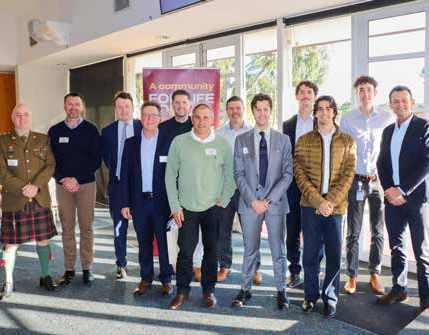
The annual Pathways Breakfast was hosted by the Old Scotch Collegians on July 31 in the Boarders Dining Room. It provided Year 11 and 12 students the opportunity to form connections with OSC mentors and special guests who took time out of their busy schedules to impart their industry knowledge with the students.
A special thank you to Adam Gilchrist (current parent), who provided a particularly inspirational address on the morning. We have no doubt this wonderful group of senior school students will go on to achieve their dreams and find success in their chosen careers.

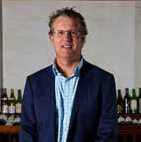
After leaving Scotch I studied Dentistry at UWA, and then continued my studies in Orthodontics at the University of Adelaide.
I am currently working in South Perth and Willetton in private practice and have been a visiting Orthodontist to Kalgoorlie over the past 20 years. I am a part-time Clinical Senior Lecturer at UWA in the orthodontic department and volunteer with a group of orthodontists working on cleft lip and palate patients in East Timor.
In my spare time I am a keen fisherman going on regular trips up to Kalbarri and locally around Garden Island and Rottnest. I am about to tackle the Canning Stock Route this year with my brother James (OSC 1986), which has been some time in the planning. I am married with three children. My eldest son graduated from Scotch in 2022, and my youngest is currently in Year 8. I enjoy catching up with many of the Old Boys at school and associated functions.
After leaving Scotch College in 1984 I completed a Bachelor of Physical Education and Dip Ed. at UWA. I worked at CCGS for 11 years as a Physical Education teacher before studying for a Graduate Diploma in Wine Business and a Diploma in Wine and Spirits (WSET).
In 2000, I made the move into the Wine industry and am now a Director of Vintage Fine Wine Distributors (VFWD), a bespoke importation and distribution business of French, Italian and South African wines to service the Perth wine trade. I have had 20 years’

I am very appreciative to be alive and healthy 40 years since leaving Scotch!
I met my wife, Emma, in my last year at school and (amazingly) she is still around, and we are best of mates. We’ve been on the family property, Yuin Station, in the Murchison area full-time since 1989. We have three kids, Tom (OSC 2008), Fran, and Henry (OSC 2011), plus two neat daughters-in-law. The boys and their families live at Yuin, so we have four energetic grandkids close by.
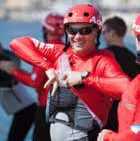
After completing a trade in Marine Electronics, I competed for the Americas Cup four times representing four nations, Australia, USA, Italy and Sweden. During this time, I twice became a Sailing World Champion.
I returned to Perth in 2018 to run a Sailing not-forprofit and the peak body for the sport in WA.
Today, I am the CEO of the Royal Freshwater Bay Yacht Club which has the largest sailing learn-to
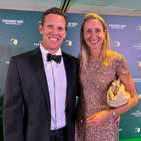
After finishing University I went to England to play cricket, which followed with the usual traveling adventure back to Perth.
Once back in Perth I took a job with Rio Tinto in Shipping, which is an industry that enabled me work in Melbourne, Brisbane, Argentina, Chile, Peru, London and finally Singapore, where I’ve been for the last 15 years. I still work in shipping, however I’m now with a shipowner named Berge Bulk who
experience as the Marketing and Sales Manager for a number of Australia’s leading wine producers including the Fogarty Wine Group. I am also the Director and Facilitator of the Wine Education Centre which delivers a range of wine courses to both the public and wine trade and has judged at several wine shows in Western Australia.
I am married to Alicia (nee Eastwood) with two children who are now studying at UWA and Notre Dame.
Sheep are a small part of our business these days, with remote concreting, civil works, water drilling and general contracting our main occupation. We’re planning to stay at Yuin until the kids kick us out. OSCs are welcome to drop in for a hot shower or room for the night on their outback trips!
program in the nation, the Technical Committee Chair of World University Sport (Sailing) and an ambassador of the Rottnest Foundation.
Outside of my professional work, I am the father of two daughters, aged 5 and 7. I was recently inducted into the Scotch College Sporting Hall of Fame, an unexpected honour and joyful return to the school on the hill.
are leading the decarbonisation race, having committed to being carbon neutral by 2025.
I met my wife, Jen, while working in London and am happily married with three wonderful kids. I also stay in touch with a lot of mates from school!
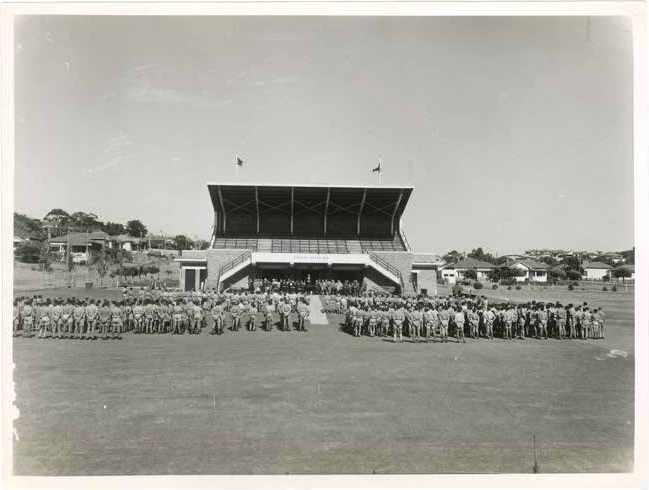
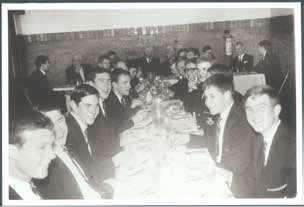
Mr Kyle Shuttleworth Archivist
extended toward the construction of the Pavilion, a highly significant feature of the College’s history.
According to a 1981 interview with Headmaster Maxwell Keys, ‘Gordon never ceased thinking of the College and what he could do for it. He came to every match that we played and realised, both at cricket and football matches, how much we needed a pavilion.’ 1
October 16th 2024 marks the 70th Anniversary of the College’s very own Gooch Pavilion.
The Pavilion, opened in 1954, was named in honour of Gordon Gooch, a student of the College between 1907 – 1912 who worked at Scotch for six months before returning to his family’s station Wandagee, near Carnarvon. Gordon Gooch was one of Scotch’s greatest benefactors and his generous philanthropy
As it was built on the grounds of the Memorial Playing Fields, there was evidently a strong association for the Pavilion to have a beneficial sporting use. There needed to be somewhere for parents, staff, students, OSCs, and other members of the Scotch community to watch the games, so naturally a pavilion came to mind. Formal dinners would quite frequently take place after sporting events, particularly if teams had claimed victory, such as the First XVIII dinner in 1964.
Extensions to the Gooch Pavilion were completed in 1977, allowing for more seating, a function area and changing rooms. Nowadays, the Pavilion also sports a kitchen, bathrooms, storerooms, and archival cabinet displays.
The Gooch Pavilion has hosted many events and significant occasions throughout its nearly seventy-year history, including sporting matches, ANZAC Day services, Highland Games and reunions.
An archival display will be made in time for this anniversary.
References
Gregory, Jenny. Building a Tradition: A History of Scotch College, Perth, 1897-1996. University of Western Australia Press: Perth, 1996.
1 Keys, 1981 interview, op. cit.
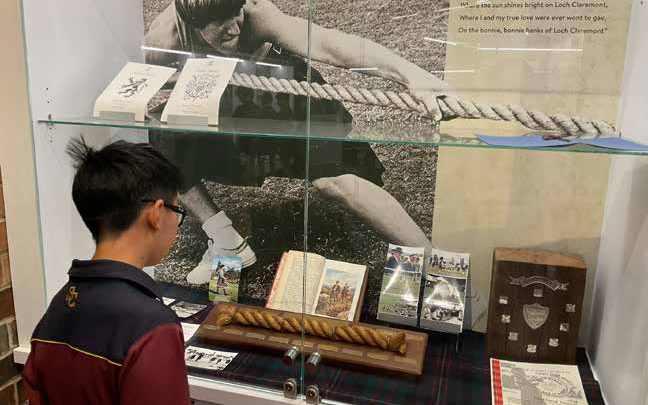
Archives this year has made a considerable effort to bridge the gap between the 127-year old collection and the level of interaction across the Scotch College community. Earlier this year Archives made displays around the College and utilised a range of interactive activities to engage the community.
The Rugby Display was curated in March in the Heritage Centre, comprised of rugby uniforms, photos, and trophies since the sport’s inception at Scotch in 1950. The Year 11 & 12 Rugby Team visited the display so they could learn about the heritage of rugby at Scotch before they started their rugby season for the year.
During these archive visits, Archivist Kyle Shuttleworth introduced his role at the College, and explained the significance of the artefacts on display. The Rugby team then freely observed the display, as well as the wider displays in the Heritage Centre. After regrouping, there was a rugby quiz which tested their rugby knowledge; a further way of having them engage with the archival experiences.
Having the rugby team explore the memorabilia on display was beneficial to their awareness of the sport’s heritage at the College, allowing them to reflect on the evolution of the uniform styles or the OSCs who have played before them.
One of the Year 12s had not been in the Heritage Centre since he was in Year 7, highlighting the need of the Scotch College community and current students to engage with their school’s heritage on a regular, interactive basis.
Archives also curated an ANZAC Day display over the April school holidays, showcasing military uniforms, First World War photographic albums, and awarded medals, which the Year 6s visited early on in Term 2.
They too participated in an ANZAC Day quiz, as well as a treasure hunt where the boys explored the displays and filled out an answer sheet. They were particularly interested in opening the display drawers and
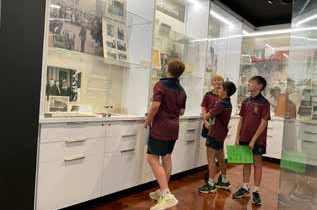
It was a good history lesson for the boys to engage with the physical archives instead of learning about them in the classroom.
many of them had questions in relation to the machine gun on display, previously owned by Peter Drummond (OSC 1912).
This was also an interactive exercise that tied into their history curriculum. The Year 6 boys were learning about immigration to Australia and how artefacts can help explain these stories. Seeing some of the artefacts on display in the Heritage Centre, was a source of inspiration for their own projects. It was a good history lesson for the boys to engage with the physical archives instead of learning about them in the classroom.
These archival encounters will be facilitated regularly throughout the year, enhancing the level of engagement between the Scotch community and its deep history.
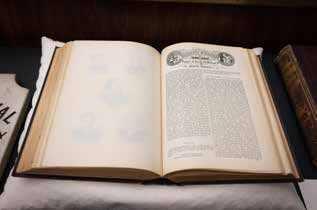
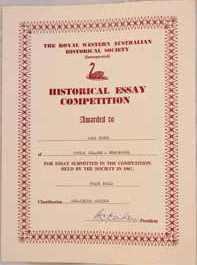

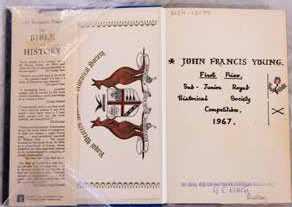
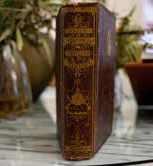
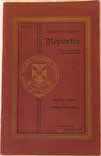
Two English Encyclopedias awarded to foundation scholar Percival Hope (OSC 1901) in Form V in 1901 by Headmaster John Sharpe, as a Council Prize for Mathematics. The publication was founded in 1859 by brothers William and Robert Chambers of Edinburgh, going on to become one of the most significant English language texts of the nineteenth and early twentieth centuries. They were donated by Hope’s descendant, Peter Quayle, in February 2024.
A collection of thirteen books and essays belonging to John Young (OSC 1970). Some of these books were awarded to John by Headmasters Maxwell Keys and David Prest between 1966 and 1970. Some of John’s work was entered into competitions such as the Sub Junior Royal Historical Society in 1967, where he received a certificate and books as his prize.
John donated his collection in May 2024.
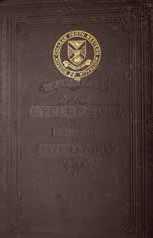
A December 1938 Reporter that belonged to Wendy’s mother-in-law, Vera Scott, whose sons attended Scotch in the 1930s-40s. Wendy’s son Phil (OSC 1991) also attended Scotch.
Wendy donated the Reporter in May 2024.
PHOTOGRAPHIC ALBUMS
Nim Bhaharatthan (OSC 2017) donated his Year 12 2017 school leavers jumper, photographic albums from 2016-17, and his summer and winter school socks.
They were donated in June 2024.
We are currently seeking more donations in our collection of:
• First World War Uniforms
• Second World War memorabilia
• Photos of Memorial Playing Fields
• OSC memorabilia
• Boatshed photos, documentation
• David Prest era memorabilia (1969-71)
• Maxwell Keys era memorabilia (1947-68)
• John Sharpe era memorabilia (1897-1904)
Wish to see more from archives at Scotch?
Please come by to visit our collection at Memorial Hall’s Heritage Centre by appointment.
Have any photos, documents, or memorabilia of your time at Scotch you would like to donate? Contact our archivist Kyle Shuttleworth at archives@scotch. wa.edu.au

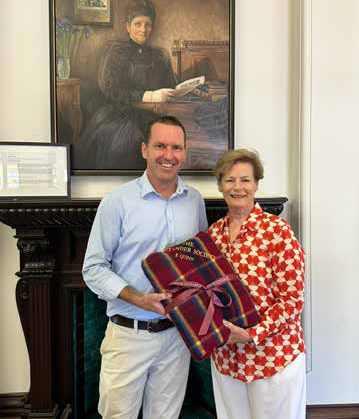

The Alexander Society enhances the educational journey of both current and future generations of Scotch Collegians.
Membership of the Alexander Society is open to those who have made provision for Scotch College in the Will, regardless of the level of financial commitment. Choosing to let us know of your intent gives us an important opportunity to thank members for this commitment. Our donors are partners in our achievements, they are part of our success, embrace our vision and are valued by our community.
For more information on how to become a member of the Alexander Society please contact Mel Colling or David Kyle at philanthropy@scotch.wa.edu.au.

Follow us on social media as we share what’s happening inside and outside the classroom.

We are immensely proud of our vibrant community at Scotch College, and we hope you share in that pride too! We would be grateful if you could take a moment to leave a Google Review about your experience with our school.

Your review not only supports Scotch College but also provides valuable insights for other families considering our school for their son.
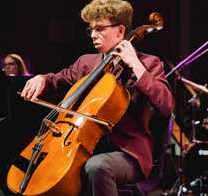
Make sure to tag us, and we’ll reshare your photos when we can. You can also email your great Scotch snaps and captions to marketing@scotch.wa.edu.au or text +61 417 634 741. Find us at:
@scotchcollegeperth
Scotch College, Perth
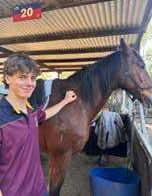
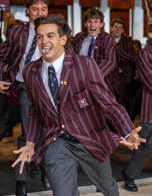

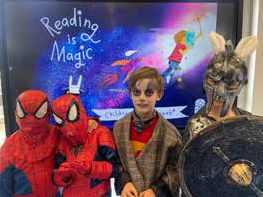
@scotchcollegeperth
ScotchCollegeWA
